Old Gold&Black
“Covers the campus


“Covers the campus

Two university-sponsored events and two student-led events mark one year since Hamas’ initial attack on Israel
Wake Forest students and administrators came together throughout the day on Oct. 7 for four events on campus to commemorate the rst anniversary of Hamas’ attack on Israel and the war that followed.
Two events, “Marking One Year Memorial Service” and “Spread Cream Cheese and Hummus, Not Hate” were organized by students, while a Community Re ection event and an Interfaith Prayers for Peace were hosted by the University.
“We hope that these times of collective re ection will inspire thoughts of what a more just and ethical future could look like as we dream, hope and pray together for a better tomorrow,” Chaplain Chris Donald, whose o ce sponsored the University-hosted events, said.
On Oct. 7, 2023, Hamas carried out a surprise attack on Israeli towns bordering the Gaza Strip — a Palestinian territory that Israel and Egypt have blockaded for 16 years. e attacks resulted in the death of 1,200 Israelis and the capture of more than 200 hostages. ere are an estimated 100 hostages still unaccounted for. Israel’s counterattack has included sending air strikes and troops into Gaza, which now faces a humanitarian crisis. Approximately 41,500 Palestinians have been killed, including civilians and militants.
Since then, the Wake Forest community has responded in several ways, including hosting vigils, teach-ins, demonstrations and protests.
Alongside the on-campus events, another speaker event was held o -campus. Titled “One Year Since al-Aqsa Flood: Re ections on a Year of Genocide and Resistance,” Rabab Abdulhadi spoke at a
local church to a crowd of approximately 100 attendees. e event was originally planned to be hosted on campus but was canceled after the University faced signi cant backlash, including a studentrun petition that garnered over 8,000 signatures. A university-wide email from President Susan Wente and Provost Michelle Gillespie announced the cancellation of the speaker event and any other event that “is inherently contentious and stands to stoke division in our campus community.”
Student organizations come together to promote peace
Early in the day, Wake Forest Hillel and the Muslim Student Association (MSA) collaborated to host “Spread Cream Cheese and Hummus, Not Hate,” a pop-in event on the rst oor of Benson University Center, where community members enjoyed a variety of bagels, cream cheese and hummus. Members of both organizations sat together in a show of unity and welcomed conversations about antisemitism and Islamophobia.
Regarding their collaboration with Wake Forest Hillel, MSA Vice President Mai Soliman told the Old Gold & Black that disagreement should not lead to dehumanization.
“No real progress is going to be made if both sides are just yelling at each other,” Soliman said. “We’re here to grow as people, and we need to see both sides of the story with any topic, so by doing events like this, we’re trying to spread unity.”
Hillel President Andrew Orfaly hoped the event would help the community look beyond stereotypes.
“A lot of narratives are narratives pushed by people who don’t want peace,”
Orfaly said. “But these communities can come together and be friends.”
Students mourn lost lives
Wake Forest Chabad and Hillel hosted a memorial service to honor those who died on Oct. 7. e event, which saw approximately 100 attendees, was closed to non-Wake Forest community members, and participants were required to show their student ID upon entry. To the Old Gold & Black’s knowledge, this was the most heavily attended event on campus that day.
During the memorial, student leaders in the Wake Forest Jewish community expressed sentiments of unity and the importance of prayer, love and passion. Prayers for those in captivity and members of the Israel Defense Force (IDF) were also read.
“It’s still very sad, and is something that’s still very raw for a lot of people,”
Vice President of A airs and Relations for Wake Forest Chabad Samantha Dorfman said. “But we also recognize that it is a year later and are trying to still have a sense of hope and spread that with people, and just bring people together.”
Before the memorial began, Matt Clifford, assistant vice president of campus life, announced that the University reserved the right to remove any students from the event who disrupted the presentation.
“Wake Forest a rms the commitment to free expression and a free inquiry,” Cli ord said. “All values, beliefs and perspectives deserve to be articulated and heard free from interference.”
“It’s all gone”: on Helene
Many on Wake Forest’s campus are grappling with the e ects of Hurricane Helene, which caused devastation across Appalachia over the weekend. For several students who call Asheville home, their families are now navigating severe damage in their hometown.
“If someone … told me [last week] a hurricane would hit Asheville, I would say they were crazy,” Josie Vickory, a sophomore who is from the city, said.
On ursday, Sept. 26 and Friday, Sept. 27, Hurricane Helene caused devastation across western North Carolina, eastern Tennessee and upstate South Carolina after making landfall as a Category 4 storm along the Gulf Coast of Florida. Helene raged as rain and wind swept through the Appalachian mountains, reaching North Carolina by ursday night. Devastating oods ensued.
As of Oct. 8, the death toll across the southeast is over 230, including 119 in North Carolina. Helene is at least the fourth deadliest hurricane to hit the United States mainland since 1950.
A struggle to communicate
Although Helene weakened as it moved north, it still dropped over 20 inches of rain across much of western North Carolina, which, when combined with heavy rains during the week leading up to it, spelled catastrophe for the area. e storm’s impact was unimaginable to most residents, and the destruction was immense. At its peak, 4.5 million power outages occurred and, as of publication one week after the storm left the region, 757,000 persist, including over 200,000 in western North Carolina.
Senior Alice Wood, who was born and raised in Asheville, calls her mom every morning like clockwork. However, Helene’s impacts in western North Carolina have prevented the ritual. Her parents do not have internet access. rough keeping up with her local newspapers and other statewide publications, Wood has been the messenger. Every post she sees on social media or news updates, she tries to convey to them via text.
See Helene, Page 11
Rabab Abdulhadi speaks off-campus Page Three
A little over two weeks ago, an area close to our campus faced a horrific tragedy. The aftermath of Hurricane Helene has left many people from western North Carolina without access to food, clean water, power or their homes.
Helene hit shore as a category four hurricane on Sept. 26 before traveling up the east coast. So far, 227 people have died as a result of Helene. The N.C. Medical Examiner's Office has reported 120 deaths in the state. Death tolls are expected to rise as the impacted areas continue to be searched.
In the wake of the storm, many western N.C. residents are facing in -
stances of price gouging, which our City & State section reports on in this edition. As of Friday, Oct. 4, the N.C. Department of Justice had received more than 200 reports of price gouging. Primarily, the costs of hotels, groceries and gas prices have seen a spike as people struggle to rebuild their lives.
Though students at Wake Forest come from across the country and the globe, N.C. has become home for the four years we study here. We come to care for it — appreciating the beauty of its regions, towns and people that were strangers to many of us before.
Since the devastating hurricane, the Old Gold & Black has worked to make
our readers aware of various ways to provide help to affected communities. We have also talked to students with direct ties to the regions in N.C. that were affected. These stories are under our Environment section in this week’s edition.
For those who spoke to us about their experiences, we at the Old Gold & Black want to extend our deepest gratitude. As journalists, part of our job is asking people to be vulnerable, which can be incredibly difficult for our sources. We recognize that no one owes us their story, and we are extremely lucky and grateful to have people who are still willing to entrust
THE STUDENT NEWSPAPER OF WAKE FOREST UNIVERSITY SINCE 1916
MADDIE STOPYRA EDITOR-IN-CHIEF stopmf21@wfu.edu
BREANNA LAWS MANAGING EDITOR lawsbn21@wfu.edu
>> NEWS
Maria Silveira, silvmt23@wfu.edu
Skyler Villamar-Jones, villsc22@wfu.edu
>> CITY & STATE
James Watson, watsjc22@wfu.edu
>> FEATURES
Ella Klein, kleiek22@wfu.edu
>> ENVIRONMENT
Ella Klein, kleiek22@wfu.edu
Mia Springer, spriml21@wfu.edu
>> OPINION
Virginia Noone, noonvc21@wfu.edu
>> SPORTS
Andrew Braun, brauar23@wfu.edu
Sean Kennedy, kennsm21@wfu.edu
>> ARTS & CULTURE
Lydia Derris, derrlf23@wfu.edu Adam Coil, coilat21@wfu.edu
SHAILA PRASAD DEPUTY EDITOR prassp21@wfu.edu
>> PHOTO
Isabella Parolini, paroir22@wfu.edu
>> VIDEO
Jack Perez, perejw22@wfu.edu
>> DESIGN CHIEF
Oliver Hale, haleop21@wfu.edu
>> COPY CHIEF
Alex Keating, keatam23@wfu.edu
>> WEBMASTER Christina Tran, tranth21@wfu.edu
>> ADVERTISING DIRECTOR
Ellie Otteson, otteej23@wfu.edu
>> SOCIAL MEDIA
Sophie Chan, chansr23@wfu.edu
>> EDITORIAL COMMITTEE
Breanna Laws (Chair), lawsbn21@wfu.edu
Virginia Noone, noonvc21@wfu.edu
>> ADVISER Ivan Weiss, weissij@wfu.edu
Want to write for us? Email wfuogb@gmail.com
us with them.
As the communities impacted by Helene continue their work to rebuild, the Old Gold & Black urges its readers to practice the principle we were exposed to on our first day here — Pro Humanitate. Take care of one another; hold space for one another’s stories; advocate for those in need. These small steps are what make a world of difference.
For students facing difficulty following Helene, the University Counseling Center and Office of the Chaplain are available for support. For faculty and staff, confidential support is available at the Employee Assistance Program.
EVAN HARRIS MULTIMEDIA DIRECTOR harres22@wfu.edu
RYDER SOLBERG BUSINESS MANAGER solbrs23@wfu.edu
>> POLICIES
Our job as a newspaper is to be a platform for all voices, not just the ones we agree with. However, we reserve the right to reject advertisements that are vulgar, inaccurate, obscene or violate Wake Forest’s policies on nondiscrimination, diversity, equity, and inclusion as they pertain to student organizations. We will also reject any advertisements that promote illegal activities according to the state of North Carolina.
Not only do we hold our newspaper and its contents to a high standard, but we also expect that those who choose to use us as an outlet for their ideas, opinions and skill hold themselves and their content to a high ethical standard.
e Old Gold & Black is published ursdays during the school year, except during examinations, summer and holiday periods, by Triangle Web Printing of Durham. e views expressed in all opinion pieces and advertisements contained within this publication do not necessarily re ect the opinions of the Old Gold & Black. As part of our commitment to reporting news fairly and accurately, we will not remove any previously published content online unless it is retracted. If an error in either our online or print content is brought to our attention, we will revise the originally published article with an appended correction. In order to facilitate thoughtful and appropriate debate, profane, vulgar, or in ammatory comments on our website are not allowed and will be deleted. Comments which incite violence, target individuals in a form of cyber bullying, or which promote ideas which vilify marginalized communities will be deleted, and proper authorities may be noti ed and involved.
>> SUBMISSIONS
e OGB welcomes submissions in the form of story tips, columns and letters to the editor. Letters to the editor should be fewer than 500 words, and columns should be around 500 words. Send yours via e-mail to stopmf21@wfu.edu the Monday before publication. We reserve the right to edit all letters for length and clarity. No anonymous letters will be printed.
>> ONLINE MEDIA
Web: wfuogb.com
Facebook: facebook.com/ogb1916
X (Twitter): @wfuogb
Instagram: @wfuogb
TikTok: @wfuogb
Sports X (Twitter): @wfuogbsports
Continued from Page 1
Similar to student groups, the University hosted both a pop-in event and a memorial service. e Community Re ection Event, hosted by the O ce of the Chaplain, was held at 4:45 p.m. on the front steps of Wait Chapel and featured prayers and scripture readings from each of the chaplains. After the readings, community members were invited to write a prayer or light a candle for peace. Approximately 30 community members attended the event.
Donald, who led the event, recognized
the shock, confusion, anger and sorrow experienced by many because of Oct. 7.
“We’re gathered here to give voice to our sorrow,” Donald said. “In this time of re ection and prayer, we mourn the lives lost in violence and war, and we hope for a better future.”
Senior Jenna Agin, one of the two students who attended, said that it is important for the campus community to recognize the anniversary of Oct. 7, though she said the event would have had a greater impact if more students attended.
“I would always advocate for unity over division,” Agin said. “As a Jewish person,
it’s super important to me. I know people who lost friends on Oct. 7 in Israel, so it’s something that has a lot of emotional weight for me and lots of people I know. So I’m glad [the University] held this event.”
Earlier in the day, an Interfaith Prayers for Peace pop-in event was also hosted by the o ce of the Chaplain and took place on Manchester Plaza. Community members were again invited to write a prayer or light a candle for peace. Members of the chaplaincy sta were present at the event to have a conversation or lead an individual prayer.
“A lot of people hope that the world can be a better place and that we can respect the life and dignity of each person,” Donald said. “And it is worth expressing that hope in order to remind ourselves of it, particularly at a time when things seem so bleak, and to recommit ourselves to pursuing that better world.”
Editor’s Note: e Old Gold & Black is actively working to cover Dr. Rabab Abdulhadi’s talk. is story will be updated online with links to additional coverage.
Contact Skyler Villamar-Jones at villsc22@wfu.edu
ELLA KLEIN Features Editor
Over 120 attendees gathered in a local fellowship hall on Oct. 7 to hear from Dr. Rabab Abdulhadi after her oncampus event “One Year Since al-Aqsa Flood: Re ections on a Year of Genocide and Resistance” was canceled last week by Wake Forest administration. Her arrival comes after several Wake Forest and Winston-Salem community members came together to advocate for and fundraise for her arrival in the city.
Abdulhadi was originally scheduled to give a lecture at Wake Forest on Oct. 7, one year after Hamas’ surprise attack on Israeli towns bordering the Gaza Strip, which resulted in the death of 1,200 Israelis and the capture of 200 hostages. Since then, according to the O cial Health Ministry, over 41,500 Palestinians have been killed in the ongoing Israel-Hamas war.
Co-sponsored by ve di erent departments within the University, the event was canceled after pushback from several Jewish students, who created a petition to cancel Abdulhadi’s talk that amassed over 8,000 signatures. e petition cited claims of Abdulhadi spreading antisemitic rhetoric and supporting Hamas.
In response, Rubin Presidential Chair of Jewish History and Professor Barry Trachtenberg, a member of the faculty seminar that organized the speaker event, Free Palestine WFU, a pro-Palestinian student group and Wake Forward, a faculty group advocating for progressive ideology, wrote a letter petitioning to bring Abdulhadi to speak in Winston-Salem. Trachtenberg reported that the letter gathered over 800 signatures. e Old Gold & Black veri ed this gure, although signatures remain private.
Without a liation or monetary support from the University, organizers held Abdulhadi’s event at the Unitarian-Universalist Fellowship of Winston-Salem.
“ ere were so many people who were crushed and disappointed by the University’s decision to cancel the talk, that it felt like there was an obligation on us to try to do our best to make it happen,” Trachtenberg stated in an interview with the Old Gold & Black.
According to Abdulhadi, the University did not personally communicate with her about canceling the event.
“ ey never talked to me, they never asked me ‘what do you think,’ ‘what are you going to speak about’ — nothing. ey just made an assumption, without talking to me,” she said.
e una liated, rescheduled talk was not publicized on any public platforms. Trachtenberg said the organizers were “limiting publicity” of the talk to ensure the safety of the facility and the speaker.
Abdulhadi is a professor and the founding director of the Arab and Muslim ethnicities and diasporas studies program at San Francisco State University.
In an interview with the Old Gold & Black, Abdulhadi discussed the personal impact of the University’s cancellation.
“I felt that it was an academic insult,” she said. “If they were going to do it, why didn’t they do it earlier –– before I bought the ticket, before I rearranged my schedule, I rearranged my classes? It was an inconvenience.”
Professor Abdulhadi speaks at the fellowship hall
Abdulhadi spoke for a little over an hour after an introduction from Trachtenberg. She began her talk by
stating that the cancellation of her event at Wake Forest did not deter her.
“ ere is no way that I wasn’t going to come. e fact that people banded together and said, ‘we’re to host you, we’re not going to listen to what Wake Forest University and its Zionist complicit allies said,’ was a huge important honor — to say we’re not going to be silenced,” said Abdulhadi.
Abdulhadi spoke at length regarding the University’s cancellation of her talk.
“I was actually very furious that I was silenced…and I also found it hypocritical that there was a Zionist who came to speak, almost under the same title, and then I wasn’t allowed to speak,” she said.
In an email, Abdulhadi con rmed her above statement was regarding a lecture given by Israeli-American David Makovsky, the director of the Koret Project on Arab-Israel relations, hosted on April 16, 2024, at Wake Forest.
Abdulhadi also voiced dissent regarding the Oct. 7 memorial hosted by Chabad and Hillel, Jewish student organizations, on Wake Forest’s campus.
“Wake Forest is already having a huge event by pro-Israeli groups that is on [the] University campus, that even if [the] University has not paid a single penny for it, at the very least, by hiring the university police, paying them, probably overtime because it’s evening, and having it happen, they are already commemorating Oct. 7,” she said. (Editor’s note: the Old Gold & Black can not substantiate any claims about the payment of University Police at this event)
Regarding the claims that Abdulhadi is a supporter of Hamas, she did not directly address any controversy.
“I support the United Nations Charter that says people who are under occupation have the right to defend themselves,” Abdulhadi stated as part of her discussion surrounding her viewpoints on Palestinian liberation.
Abdulhadi emphasized that “history
did not begin on Oct. 7,” referencing that the con ict between Israel and Palestine existed long before Oct. 7, 2023.
She also discussed the systematic structure of colonialism, Palestinian liberation and the frustrations of being a Palestinian professor and scholar. At the end of her initial remarks, audience members gave her a standing ovation.
Audience questions
After Abdulhadi’s talk, Trachtenberg moderated a short Q&A with the audience. Questions included her views on social media, youth activism, the erasure of Palestinian academics and voting in the upcoming election.
Steve Feldman, a candidate for North Carolina’s 10th congressional district, asked Abdulhadi what she wants Palestinian liberation and the end of war to look like.
“ at refugees are able to return to their homes — that we can sit under olive trees and talk with each other and sing with each other,” Abdulhadi said.
In an interview with the Old Gold & Black, Feldman expressed that he was not surprised the University canceled Abdulhadi’s on-campus talk.
“ ere are really well-meaning people who think that she wants to kill Jews,” Feldman said. “I feel that if somebody were attacking me for being Jewish, she’d probably [be more likely to] stand up for me than a lot of those other people who think that she’s a terrorist.”
Abdulhadi also spoke about why she felt it was important she still came to Winston-Salem to give her talk.
“It was really important that we felt energized — that we weren’t defeated. It was really important for us to come together, not allow them to silence us,” she said. “And I felt very welcomed; I felt very warm; I felt a lot of love.”
Contact Ella Klein at kleiek22@wfu.edu
• An individual consumed food and failed to pay. ey were issued a trespassing warning on Village Way. e report was led at 4:22 p.m. on Sept. 30.
• A Budd Group employee’s vehicle was stolen from David F. Couch Ballpark. e report was led at 1:31 p.m. on Sept. 30.
• Two individuals had their bike seats stolen from Reynolda Hall. e report was led at 3:40 p.m. on Sept. 30.
• An underage individual was intoxicated in a bathroom located in Collins Residence Hall and requested medical assistance. ey were transported to Atrium Health Wake Forest Baptist Medical Center. e report was led at 1:43 a.m. on Oct. 5.
comics.
HOPE ZHU Contributing Writer
As an array of national ags hung on Davis Field, the Intercultural Center (IC) launched the fteenth annual World Culture Festival with a blast of Latino rock. Students and faculty gathered around a feast of globally sourced cultural dishes, performances and games.
e festival, which was held on Friday, Oct. 4 from 5 p.m. to 8 p.m., was organized by the IC with a mission to showcase the diversity of cultures that enrich the Wake Forest campus. “ is day is celebratory for what makes up the Wake Forest community as a whole that isn’t always ampli ed in a lot of spaces,” Jalen Shell, the assistant director of the IC, said. “ is is a day to showcase that you belong here.”
e festival featured many campus organizations, including the Lam Museum of Anthropology and the University Counseling Center, alongside student clubs and organizations like the World Tea Association, Asian American Identity Group, Organization of Latin American Students, Wake Forest Culturality and more.
Stormy Harrell, the Lam Museum’s collection manager, detailed this year’s selection of North Carolina indigenous artifacts: Native American rain sticks from Mexico, stone tools resembling arrowheads discovered in North Carolina by local archaeologists in the ‘30s and ’60s and a collection of East Asian children’s books, including Japanese
“We tend to bring di erent stu out every year, representative of every culture,” Harrell said.
Senior Ugo Okoli from Seattle paused at the Lam Museum table to ip through a comic book. After sampling some Spanish card games that were new to him, he shared his joy at the cultural diversity he found.
“I think the more diverse and inclusive, the better,” Okoli said. “Every place could use more of that.”
While the festival is intended to bring new experiences to students, it also provides a sense of belonging. Christos Koumpotis, a graduate student from Greece, organized the Greek culture table all by himself. e university doesn’t have a Greek club, but Koumpotis enlisted a couple of German friends from his program for support. He served Greek-style co ee and displayed sheets with simple Greek words that conveyed richer cultural meanings.
“As an international student with no one from my country here, it’s great to share my culture,” Koumpotis said. “Being Greek is a state of mind. It’s about valuing family, friendship [and] love and being grateful for what you have while appreciating your neighbor and fellow human.”
Food has been the main attraction of the festival, as shown by the lines of students weaving across the lawn for the various ethnic cuisines set up at the catered tables. e IC sta curates a global spread of tastes found here in Winston-Salem: crispy falafel skew-

ers from the Mediterranean, savory Chinese fried noodles and dumplings and El Salvadorian stu ed corn cakes known as pupusas, to name a few.
“[Seeing] so many people coming for foods they might cook at home, dishes their parents usually prepare but that they rarely see on campus, just makes me really happy,” sophomore Alex Janvier, a student intern at the IC who helped select the food, said.
Students also watched a diverse lineup of performances, including the lively Deacon Dhamaal, an Indian dance
club, the infectious rhythms from the Charlotte African Drum and Dance Collective and the graceful performances by the elders at the Wenhua Chinese School.
ere’s a lot to do at Wake Forest, a lot to learn, and many people from whom you can learn,” Shell said. “ ere are numerous opportunities to gather small insights that contribute to something bigger.”
Contact Hope Zhu at zhuq21@wfu.edu
Participants raised $303,000 for the Brian Piccolo Research Fund
JILL YODER
Contributing Writer
Despite a day of gray skies and rain, the Wake Forest community brought energy to Hit the Bricks on Sept. 26, breaking the previous year’s record by raising over $303,000. Over 2,000 students, faculty, sta and alumni raised money by run-
ning, walking and dancing over 14,000 laps around Hearn Plaza.
Since its start in 2003, Hit the Bricks has raised over $1.5 million for the Brian Piccolo Research Fund, which supports patients and their families at Wake Forest Baptist Medical Center’s Comprehensive Cancer Center.
Brian Piccolo graduated from Wake
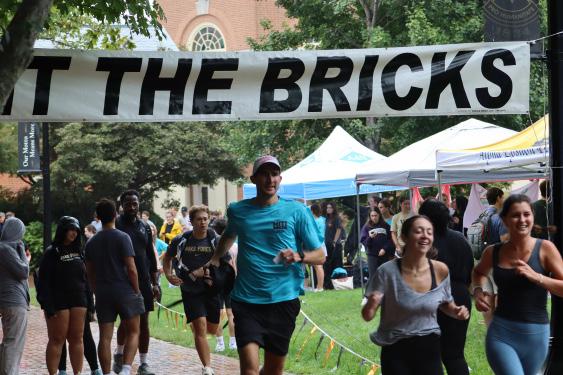
Forest in 1965. A talented football player, he went on to play for the Chicago Bears before being diagnosed with embryonal cell carcinoma in 1969. Piccolo died in 1970 but left a lasting legacy on the Wake Forest community and has been the inspiration for a campus-wide dedication to ghting cancer for several decades.
“I think Hit the Bricks reminds us that there’s a lot worse things in the world than what we’re going through,” said Hit the Bricks Executive Director Kevin Dunn. “Cancer is so ubiquitous in our society that we need to make sure we do all we can to try to stop it.”
Event planning for Hit the Bricks is a year-long process that involves securing corporate sponsors, reserving tents and equipment and, most importantly, getting students to sign up. is year the executive board grew to 13 students, each with a strong passion for Hit the Bricks and the support it provides to cancer patients and their families. e executive board expanded its reach to include more of the Wake Forest community by receiving help from a committee of over 100 people.
“I think Hit the Bricks is able to draw in so much of the student population because there is so much excitement and energy surrounding it,” freshman Maggie Whitworth said. “So many older students
at [Wake Forest] are passionate about the event and make it seem so fun to be a part of, which convinces younger students to run, as well. Hit the Bricks was de nitely a highlight of my freshman year so far, and I can’t wait to do it again next year.” e annual ursday event was shortened this year by several hours to accommodate evening storms, but the rain did nothing to diminish the energy of participants or the success of the fundraiser. roughout the six-hour event, participants had a little extra fun participating in specialty laps that required conga-lining, dancing, onesie-wearing and more. Competitions and tournaments throughout the day also gave teams opportunities to increase their points with intense rounds of cornhole and spike ball. e Anthony Aston Players (AAP) won the general competition with a total of 598 laps.
“Everyone gets to show up for their own organization and contribute to something bigger than all of us, and I think that’s really important to a lot of kids at [Wake Forest],” senior Francie Tucker said. “ e atmosphere is the best part — it’s exciting, it’s fun, it’s electric.”
Contact Jill Yoder at yodejs24@wfu.edu
OLD GOLD & BLACK
James Watson, watsjc22@wfu.edu
ELLA KLEIN Features Editor
After weeks of back-and-forth litigation, absentee ballots in North Carolina are delayed by two weeks, following Robert F. Kennedy Jr.’s ght to remove his name from the North Carolina ballot. e change will cost Forsyth County $16,000.
Kennedy is no stranger to the headlines of this election cycle. After a failed presidential campaign, Kennedy has since endorsed the Republican Party nominee — former president Donald Trump — and started a ght to remove his name from the ballots in battleground states, including North Carolina. However, he sought to stay on others — like New York.
Kennedy sued the North Carolina State Board of Elections (NCSBE) in late August, requesting that the We the People Party, of which he is the Presidential nominee, be removed from all
North Carolina ballots. at was only one month after the state board voted to allow him on. After a 4-3 ruling in the North Carolina Supreme Court by the court’s conservative majority, he was allowed to remove his name. By the ruling date, Sept. 6, the NCSBE had printed 2.9 million individual ballots statewide for the upcoming 2024 election.
e cost of reprinting ballots has been put onto counties. Tim Tsujii, the Elections Director for Forsyth County, reported that Forsyth County footed the bill — spending $16,000 on reprinting costs. e county had already printed 64,800 ballots, printing 3,400 new ballots in-house. 61,400 ballots had to be reprinted by a paid company.
“We will continue to consult with counties and ballot vendors to determine the feasible start date for distributing absentee ballots statewide, mindful of the goal to meet the 45-day federal deadline,” said Karen Brinson Bell, executive director of the State Board of
Elections, in a press release on Sept. 10. “ is decision imposes a tremendous hardship on our county boards, at an extremely busy time. But our election o cials are professionals, and I have no doubt we will rise to the challenge.”
e absentee ballots were set to be sent out by Sept. 6, but have now been delayed to Sept. 24. Military absentee ballots were sent out on Sept. 20.
Kennedy’s case was originally denied by the Democratic Majority in the NCSBE, citing that it was too late in the printing process. On appeal, a threejudge panel in the N.C. Court of Appeals permitted Kennedy to halt the ballots. Following another appeal, on Sept. 6, the four-judge Republican Majority in the N.C. Supreme Court decided in favor of Kennedy, delaying the absentee ballot deadline.
e state Supreme Court said Kennedy remaining on the ballot “could disenfranchise countless voters who mistakenly believe that [the] plainti
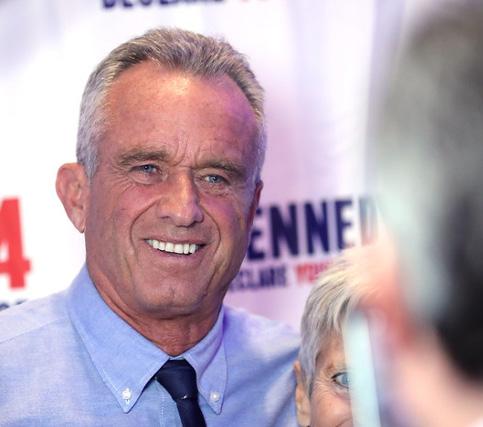
remains a candidate for o ce.” Before the re-printing, only seven absentee ballots had been requested for the We the People party.
Contact Ella Klein at kleiek22@wfu.edu
JAMES WATSON City & State Editor
N.C. Attorney General Josh Stein posted on X (formerly Twitter) on Monday, Sept. 30, that the North Carolina Department of Justice (NCDOJ) had received 64 complaints of price gouging in Western North Carolina in the wake of Hurricane Helene. By Tuesday, he posted that number was up to 70. By Wednesday, 100.
As of Friday, Oct. 4, the NCDOJ had received more than 200 reports of price gouging, initiating four civil investigative demands related to those complaints.
“People are struggling and su ering as it is because of the consequences of the storm; we will not allow others to compound their harm by stealing their money,” Stein said in a press conference on Friday.
Price gouging has been an unfortunate parasitic staple of modern hurricane and natural disaster recovery efforts. Companies and vendors looking to make a quick buck cash in on exorbitantly in ated supply and demand, articially raising the price of goods. Both Stein and the state are no stranger to these schemes.
Following the devastation dealt to North Carolina’s coastal communities after 2018’s Hurricane Florence, the NCDOJ aggressively pursued legal action against a Georgia Tree Company LLC for excessively priced tree removal services.
e company had settled with its 24 victims for $274,000. It was the state’s largest price gouging settlement in department history.
In some cases, the storm doesn't have to have happened yet for costs to be manipulated. In the leadup to 2017’s Hurricane Irma, airline tickets out of Florida surged 600% as the storm battered the Caribbean.
Stein said that among the complaints, roughly a third were about hotel prices, another third had to do with grocery prices and the last third had to do with gas and fuel prices.
Granted, businesses that are heavily impacted by hurricanes or other natural disasters might reasonably need to increase their prices. But price gouging isn't a natural symptom of a free market economy.
Like many states, North Carolina has a statute on the books that wards against price gouging during emergency circumstances.
General Statute 75-38 explicitly prohibits businesses, individuals and vendors from knowingly raising prices on goods that are used to preserve, protect or sustain life, health, safety or economic well-being of people in emergencies.
“We have been aggressively enforcing the price gouging law throughout my tenure as attorney general,” Stein said. “We've brought more than a dozen cases and won back more than a million dollars for North Carolina consumers from other emergencies.”
Since 2018, the NCDOJ under Stein has pursued 12 lawsuits against 29 defendants under North Carolina’s price gouging statute. ose suits resulted in 14 judgments or settlements totaling $1,080,000 against 25 defendants, including the $274,000 settlement against Georgia Tree Co.
As recovery e orts grow and national attention follows, the NCDOJ is also increasingly concerned about the spread of fake charities, looking to take advantage of concerned donors.
e Mountain Mule Packer Ranch, a recovery group which gained online notoriety for their literal mule-driven rescue e orts, posted on Facebook on Friday that bad actors had set up a fake
Venmo account posing as them.
“Because we have heard so many people asking, we are posting the link for the safe and correct Venmo link, and other ways to help,” Michelle Toberer, one of the Ranch’s owners, said. “We are so sorry [that] scammers have created fake accounts that look similar.”
According to Stein, he would be coordinating with local district attorneys across the state, referring criminal complaints when appropriate as investigations develop. He charged that as people picked up the pieces of their broken homes and lives, the department and the state would step up.
“We've got to maintain our commitment to those folks, not only last week, this week and next week, but in the weeks, the months and, in some cases, the years to come, because it's going to take that long for some of these communities to rebuild,” Stein said.
He continued: “Don't use this as an opportunity to make a quick buck, because if you do, you're violating a price gouging law, and it will be enforced against you.”
watsjc22@wfu.edu
As the election looms closer, the NC Democratic Party’s efforts are in full swing
NICK COSTANTINO
Contributing Writer
Anderson Clayton, the North Carolina Democratic Party chair, came to Wake Forest on Wednesday, Oct. 2 as part of her “30 in 30 campus tour.” As the name suggests, the trip involves 30 North Carolina college visits in 30 days. According to Clayton, she is visiting Wake Forest and other schools so she can better “communicate with young voters,” inform them about key voting laws and learn more about these di erent communities and the issues most pressing to them.
As Anderson has embarked on this journey of meeting people across the state, she re ected on how much hope the tour has instilled in her. To her, knowing so many young people are registered or pre-registered in the state to vote was inspirational.
Since becoming the state’s Democratic Party chair in 2023, Clayton has recruited a lot more people — making the party, from the leadership to interns, “look a lot younger” today than even a year ago. Anderson says she has strived to reinvest in the community to get young people excited about local and state politics.
In 2020, then-Democratic presidential nominee Joe Biden lost North Carolina by
a slim margin of less than 75,000 votes. Clayton said that averaged out to about 42 votes per precinct, explaining, “Every county matters, no matter the size.”
Clayton stressed the importance of mobilizing the rural population of North Carolina — beyond the major cities of Charlotte or Raleigh. North Carolina has the second largest rural population in the United States, second only to Texas and the largest of the swing states.
Due to this unique position, North Carolina voters have the potential to heavily in uence the results of the national election.
ere are more than 500,000 college students — translating to many rst-time voters — in North Carolina.
“Republicans like to say that college makes you liberal — Republicans made me a Democrat,” Clayton quipped. She added that issues like disenfranchisement and gerrymandering catalyzed her involvement in politics. She said she felt empowered when the county party reached out to her and other college students with resources on how to vote.
Wake Forest College Democrats president Caleb Pembele, who helped organize the visit, was pleased with Clayton’s talk.
“I think Clayton’s visit went really well,
and we are super thankful that she took time out of her day to come to Wake Forest,” said Pembele. “We got a good number of people registered to vote, and talked about the importance of voting all the way down the ballot.”
Wake Forest College Democrats has hosted many down-ballot candidates at their meetings, including Commissioner of Agriculture candidate Sarah Taber.
“ is way, Wake Forest students can hear from the people they have the opportunity to vote for, and when people see down-ballot candidates, they’re more likely to vote for them,” Pembele said.
Additionally, Pembele explained that, to him, local and state politics can be more important than national politics — but they don’t get the attention they deserve.
“ ese are amazing, inspiring people who have been putting in the work for years [or] even decades to make their communities and the world at large a better place,” Pembele said. “College students are the present and future of the world, and these candidates know that passing down a tradition of leadership and service is integral to getting young people excited about politics.”
You can nd more information online on how to vote in North Carolina, through
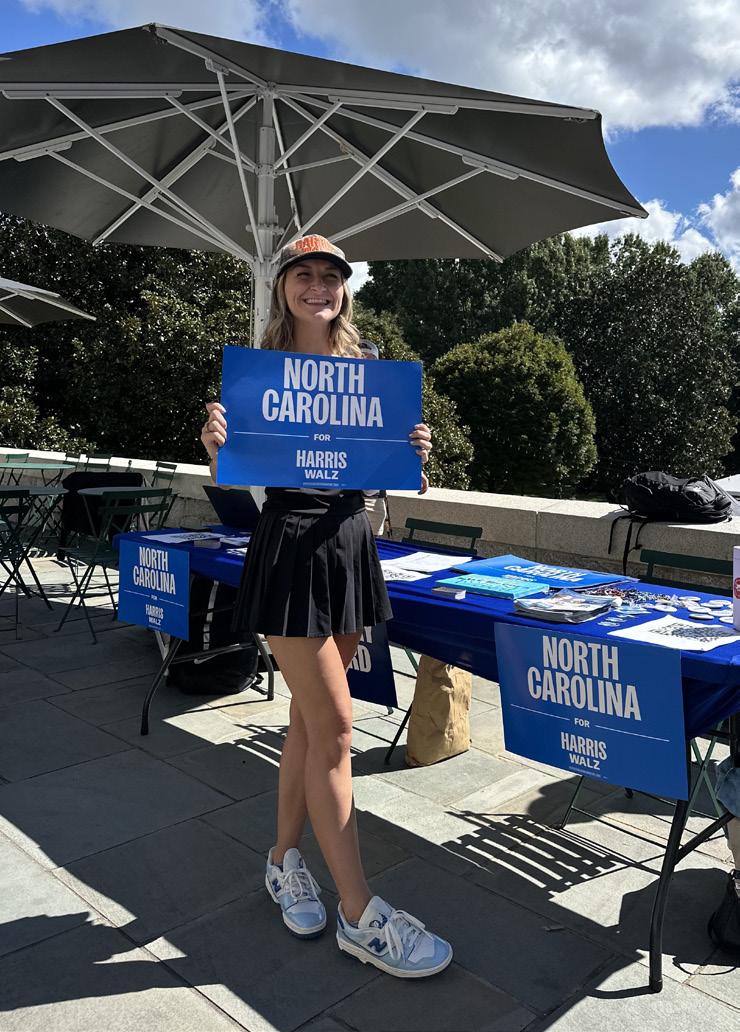
mail-in ballots, absentee voting, and in-person voting.
Contact Nick Costantino at costnp24@wfu.edu
It’s all about the money: campaigns ramp up spending in North Carolina
MALCOM BROWN
Contributing Writer
It’s no secret that campaign spending in the United States is astronomically high. In 2020, Democratic candidate Joe Biden raised a total of $1.69 billion, while the Republican candidate, incumbent President Donald Trump, raised $1.96 billion. is outpaced all previous elections for the most money raised in a presidential race.
In the same year, the Democratic gubernatorial incumbent in North Carolina, Roy Cooper, raised $41 million, while the republican candidate, former Lt. Gov. Dan Forest, raised $11.7 million.
Considering that North Carolina is one of thesevenswingstatesinthiselection,alongside Wisconsin, Michigan, Pennsylvania, Nevada and Arizona, it’s no secret that its 16 electoral votes could be a game changer on the path to 270 for either Trump or Harris.
In the 2024 race, Kamala Harris’ campaign president began a little more than two months ago. Despite this rapid entry, Kamala Harris raised $200 million in her rst week as the presumptive Democratic nominee. Since her dramatic entrance, Harris has raised $690 million as of Aug. 31. is doubles Trump’s fundraising at $313 million as of the same date. Both candidates understand North Carolina as a pivotal state in determining the election outcome, so they have wasted no time in spending money in North Carolina. But how are national and down-ballot campaigns spending their money in the Tarheel state?
As of early September, Harris has spent
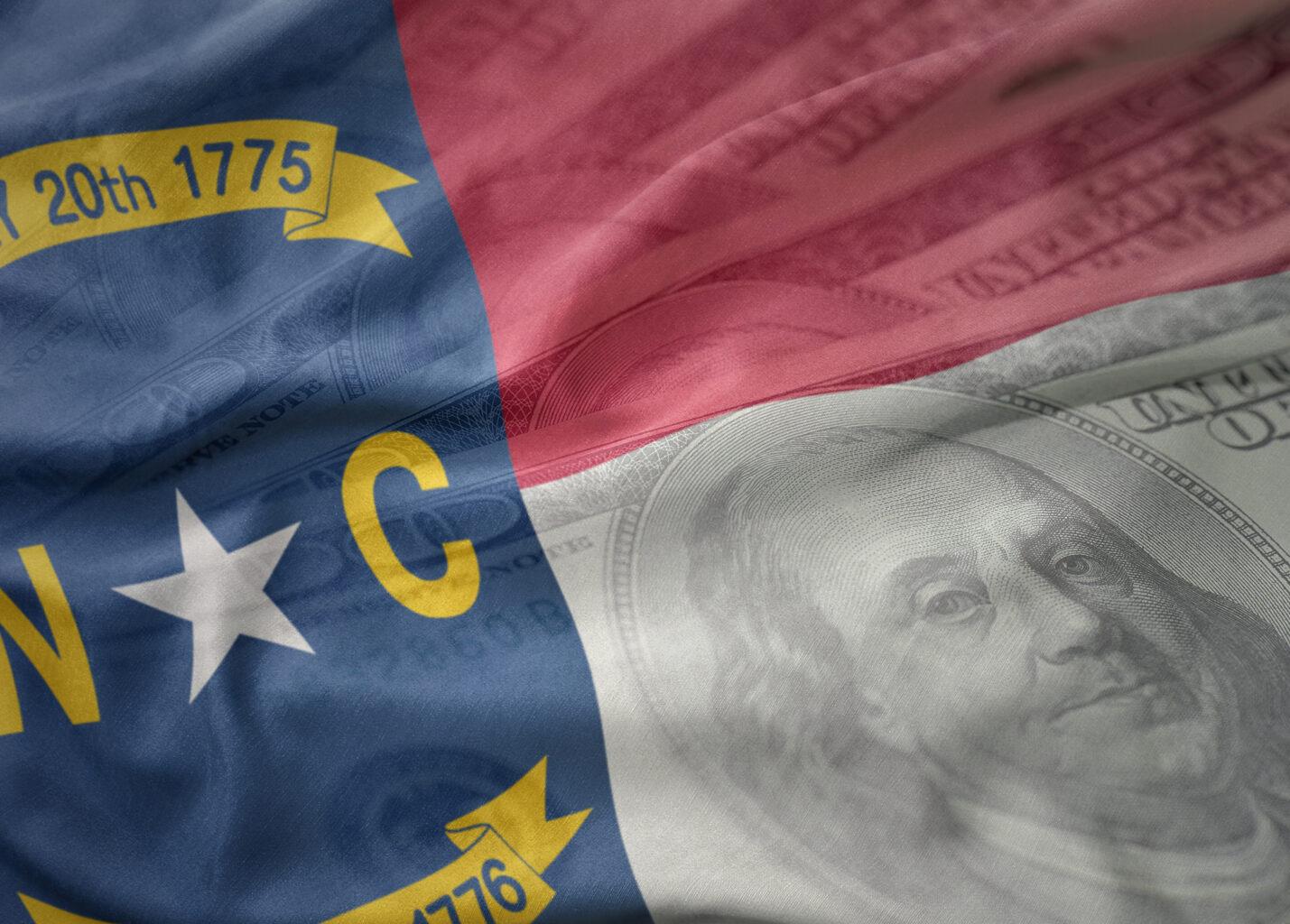
$68.2 million in advertisements in North Carolina, with Trump narrowly trailing at $55.7 million. Harris has a signi cant fundraising advantage over Trump, which led to a Trump-allied PAC announcing they would be extending their ad buy by $70 million in North Carolina for the nal weeks of the election. In a race currently at a dead heat in North Carolina, according to the latest polling, the spending of both the Harris and Trump campaigns could have a sizable
impact on who wins the state and perhaps the election.
While the presidential race draws much of the national spotlight, the gubernatorial election in North Carolina is equally critical to the state’s political future. Candidates Josh Stein (D) and Mark Robinson (R) are locked in their high-stakes battle, with both campaigns pouring substantial resources into ensuring their victories. Stein raised $32.9 million in July compared to Mark Robinson’s
$15.8 million.
Since then, Robinson has been involved in numerous scandals, including most recently, a CNN investigation that alleged he posted explicit remarks on a pornographic website — such as “I’m a Black NAZI!”
As a result, the Republican Governors’ Association (RGA), a group dedicated to electing Republicans to governorships, announced last Monday that they would not spend more money to support the lieutenant governor. With the latest polling in the state showing Stein up seventeen percentage points, this pullout from the RGA will certainly not help Robinson in his bid for governor.
Democratic spending in the attorney general race has also gained much attention. e Democratic candidate Je Jackson and Republican candidate Dan Bishop each are ghting for the coveted attorney general spot. According to the latest campaign deadlines, Jackson raised almost three times as much as Bishop from Feb. 18 to June 30. e most recent polling from September suggests Jackson is ahead, with 43% of likely voters preferring him over Bishop’s 36%; however, 21% of likely voters remain undecided. In a race that was virtually tied in March, it’s clear that the spending by the Jackson campaign is making a sizable di erence.
As the campaigns escalate spending, North Carolina remains a crucial battleground where every dollar could tip the scales in this pivotal election season.
Contact Malcom Brown at browmd24@wfu.edu
Ella Klein, kleiek22@wfu.edu
Students organize the 35th annual Project Pumpkin event, connecting Wake Forest with Winston-Salem schools
ANITA DONGIEUX Staff Writer
e 35th annual Project Pumpkin event will turn Hearn Plaza into a “Wild Adventure” wonderland, representing the desert, jungle, arctic and aquatic biomes through decorated booths. is halloweeninspired philanthropic tradition, that will occur on Oct. 24, brings together the students of Wake Forest University with local Winston-Salem schools for trick-or-treating, playing games and engaging in various booth competitions.
is year, around 35 elementary schools have been invited, many of which have been recurring participants of Project Pumpkin.
Senior and Project Pumpkin Director Grace Novak has been involved with the event since her freshman year, where she volunteered to escort children around the event. e next year Novak went on to work on the agency committee, where her main role was fostering the technical partnership between Project Pumpkin and the local elementary schools in order for the children to be able to attend the event, as well as accounting for each student on the day of. Novak became the committee chair for operations her junior year.
“My favorite part of Project Pumpkin is seeing the joy and excitement on all the children’s faces when they step out onto the quad and see all the booths and games,” Novak said. “Project Pumpkin’s greater purpose is to create a meaningful link between our community and the Winston-Salem community.”
e philanthropic foundation of the event raises money for the Wake Forest University Children’s Defense Fund Freedom School. e Freedom School is a summer literacy program, free of cost to students in the Winston-Salem area, that partners with Wake Forest students to aid local children in developing their education.
“ is year we are planning a lot of awesome fund-
raisers leading up to the event. We are working with local restaurants to plan fundraising nights. In addition, we are going to be selling goodie-baskets, labeled “Boo-baskets,” so people can surprise their friends the week leading up to the event with some philanthropic and halloween-themed treats,” Novak said.
Senior Hallie Martel, Project Pumpkin’s external director, works to support the fundraising, public relations, set design and outreach e orts that go into the foundations of this event.
“
My favorite part of Project Pumpkin is seeing the joy and excitement on all the children’s faces.
Apart from increased connection with the wider Winston-Salem community that Project Pumpkin brings, Martel appreciates the broad intention of encouraging students to grow a love for reading and learning. is encouragement is fostered through the proceeds of the event that go towards e Freedom School.
Project Pumpkin incorporates activities and entertainment for the children, provided by Wake Forest’s various student groups, clubs and other organizations. Each booth will coincide with the “Wild Adventure” theme, while organizations come up with their own activities.
As for entertainment, several Wake Forest dance and acapella groups will perform, and the Sigma Pi fraternity lounge will be turned into a haunted house. Novak encourages anyone within the Wake Forest community to get involved in Project Pumpkin.
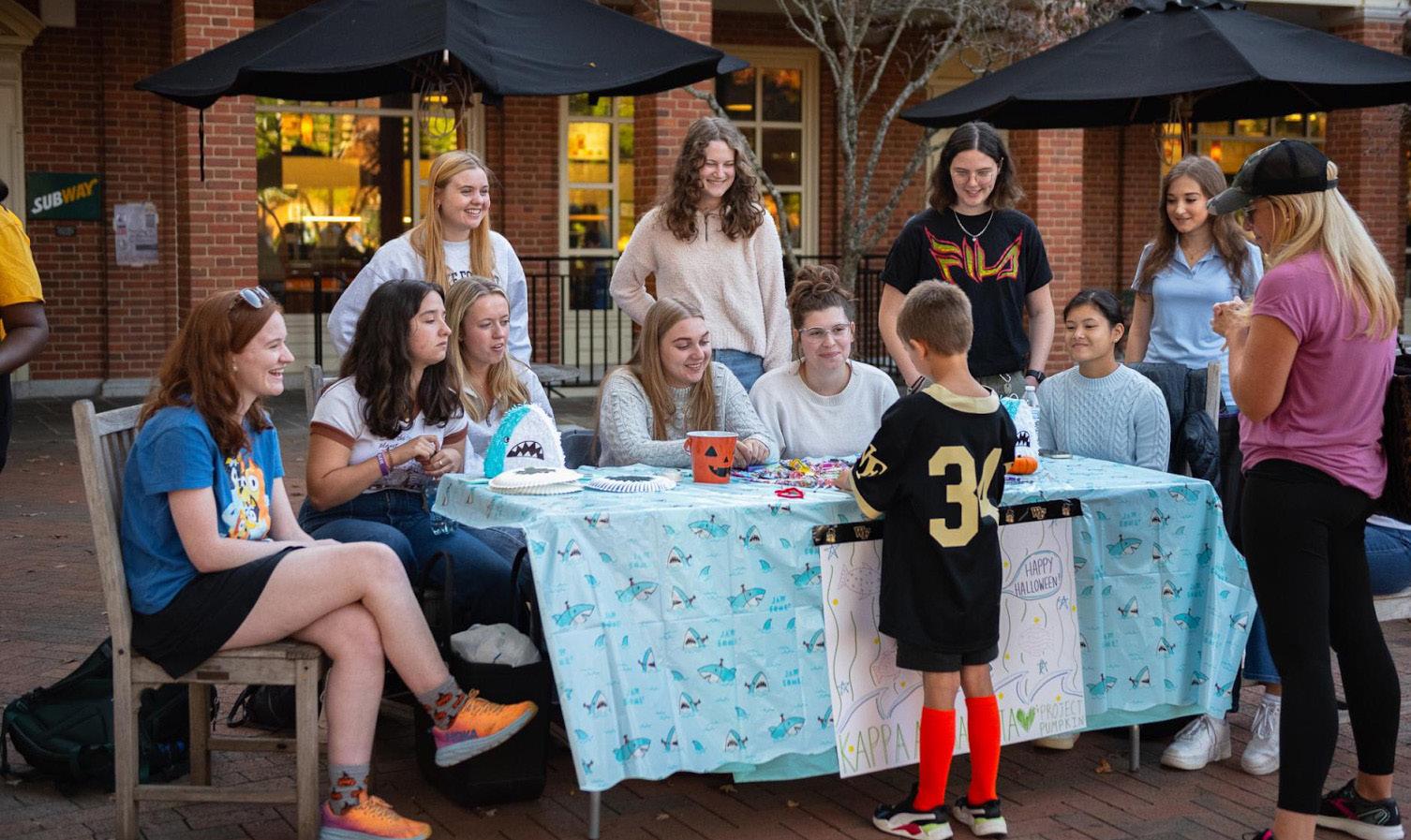

Kids from Winston-Salem schools dress up to celebrate Halloween.
“ ere are so many ways to get involved,” Novak said. “Beyond our steering committees, you can volunteer to help set up the quad, escort kids around on the day of or you can help one of your other organizations/clubs run their booth!”
Junior Derek Matthews, co-director of agency for Project Pumpkin, started his dedication to Project Pumpkin even before his time at Wake Forest, when his older sister was a student here.
“ e reason why I was initially involved in this event is because I would help my sister, so I kind of grew up around Project Pumpkin,” Matthews said.
“It has always been special to me.”
As co-director of agency, Matthews’ main job is reaching out to local schools for permission slips and registration forms that allow the kids to join the event. Of those able to attend, Matthews works to check in all of these students the day of.
Sophomore and fellow co-director of agency, Ava Josef, says her favorite aspect of Project Pumpkin is the interactions between the volunteers and student participants.
Josef’s admiration for Project Pumpkin started even before her time at Wake Forest, which speaks to the in uence this initiative has outside campus borders.
“I thought it was such a fun and unique campus tradition. First semester of my freshman year, I decided it was one of the organizations I would sign up for rst.”
“[ e local elementary students] are why this event exists and is the central purpose for all of the work we do before and on the day of the event,” Josef said. “Watching these kids having fun with Wake [Forest] students and vice-versa is so rewarding.”
Contact Anita Dongieux at dongap21@wfu.edu
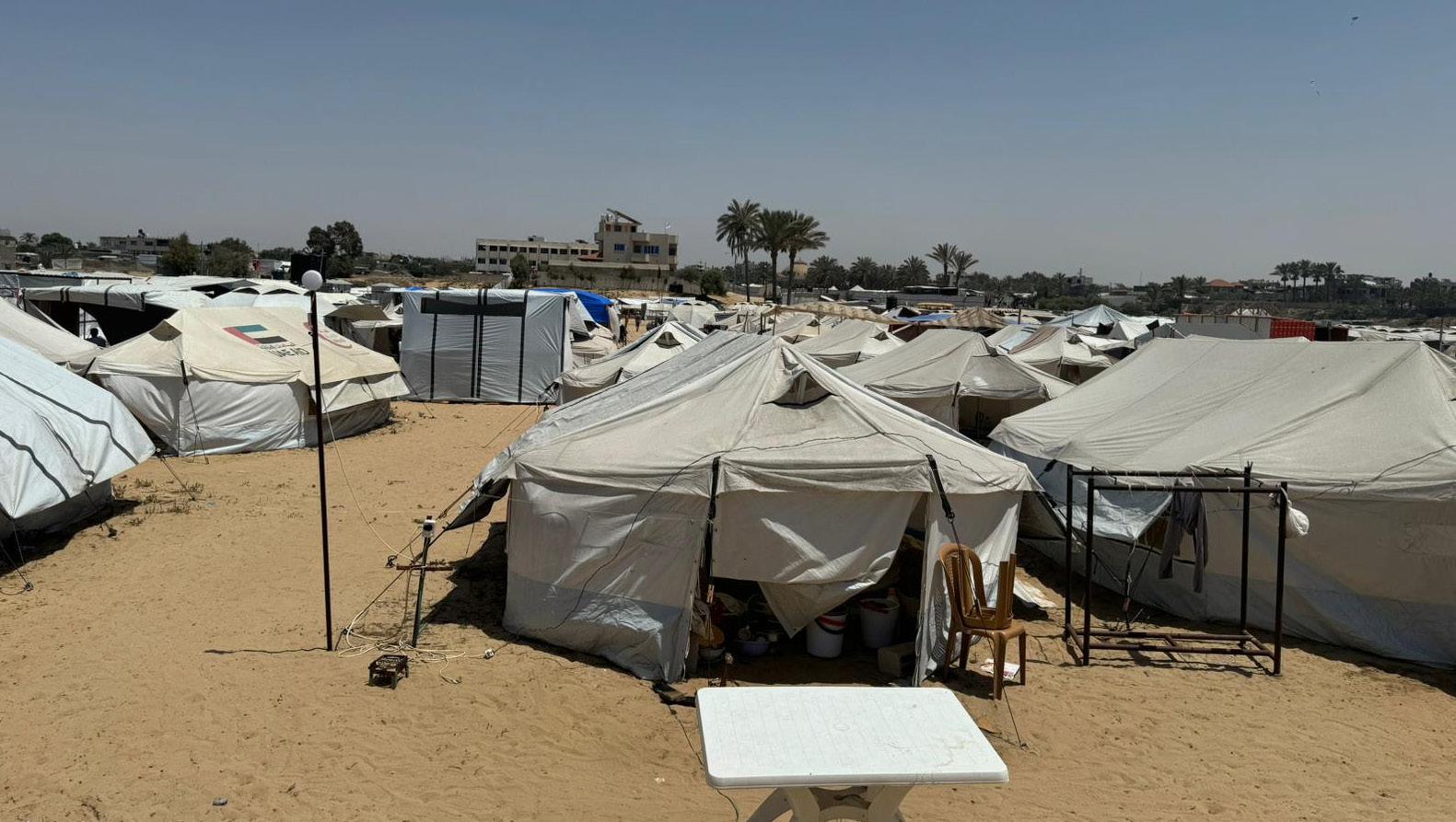

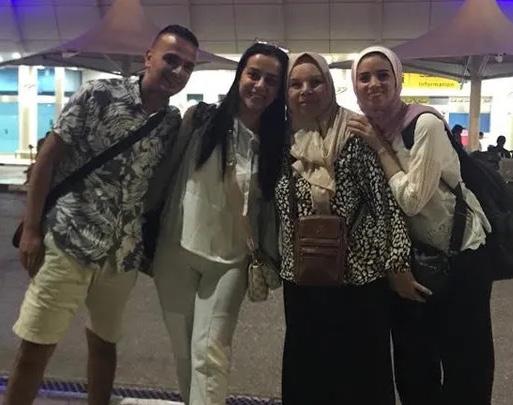
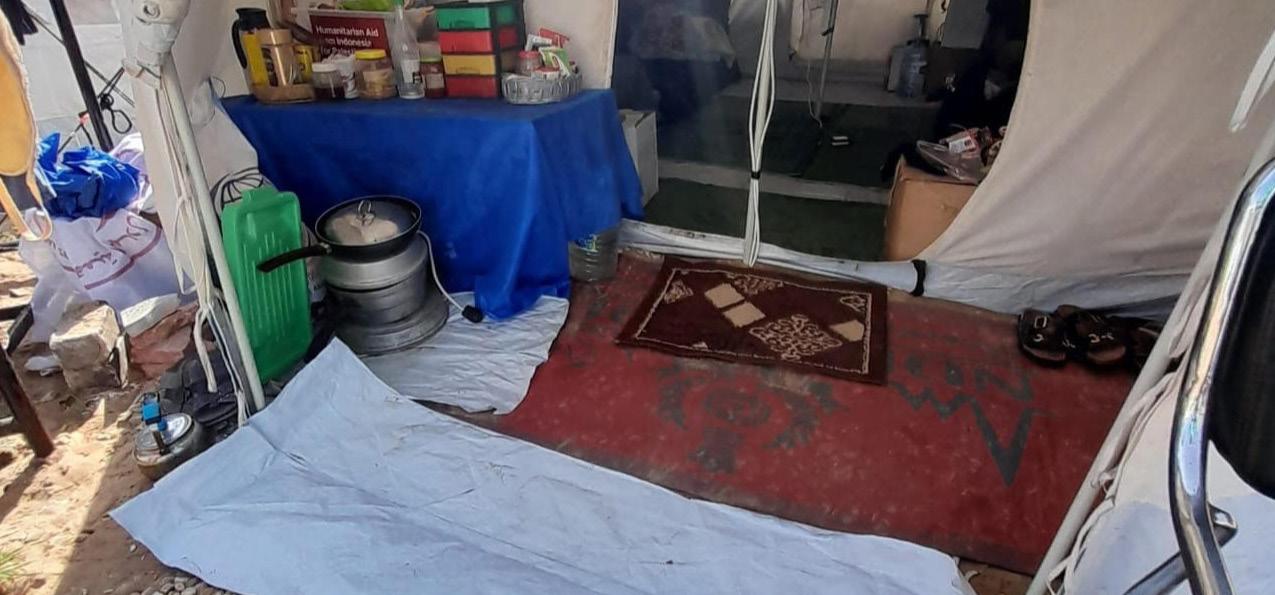
BREANNA LAWS Managing Editor
A former Wake Forest Fulbright Arabic teaching assistant from 2020-2022 is currently trapped in the Gaza Strip with her family as the Israeli government continues to restrict travel out of the country. Wake Forest community members are working to get her and her family to safety.
Maram Ahmed, who is living in a shelter with her mother and two brothers, has faced an onslaught of tragedy since the beginning of the Israel-Hamas war.
On Oct. 7, Hamas launched a surprise attack on Israeli towns bordering the Gaza Strip. Approximately 1,200 Israelis died and about 240 hostages were taken as a result of the attacks. In response, Israel has conducted air strikes and sent troops into Gaza, a region that now faces a humanitarian crisis. Israel’s attacks have killed over 41,000 people, according to the Gazan Health Ministry.
A fundraiser for Ahmed’s family is currently taking donations to support them as they remain in the Gaza Strip. e funds will go toward travel visas for them to use to get into Egypt, as well as necessities and medication for Ahmed’s mother.
e fundraiser, organized by Alessandra Von Burg, an associate professor of communication and close mentor of Ahmed during her time at Wake Forest, has currently raised over $28,000 in support of Ahmed and her family. e goal is $40,000.
With over 41,000 lives lost and countless homes being destroyed, the Gaza that Ahmed knew growing up is no longer the same Gaza today.
“I didn’t know that I love Gaza that much until I got out of it,” Ahmed said in a letter to the Old Gold & Black. “… Before the war, I made a list of new places I wanted to visit along with my mother … I didn’t have the ability to visit because of what happened.”
Ahmed’s mother, Noor, is 70 years old and has been steadily declining in health since the war began. Securing medication for her is a top priority for Ahmed and her two brothers, Ahmed and Walid, but the medication has been increasingly more di cult to obtain. (Editor’s Note: In this article, the primary source is Maram Ahmed, referred to as “Ahmed.” Please note that when “Ahmed” is mentioned in reference to her brother, it refers to a di erent individual.)
Ahmed lived in her home with her family in Gaza for over 20 years. roughout this time, Israel and Palestine engaged in various con icts, which would impact the people living in the region in a variety of ways, including a ecting access to electricity.
Ahmed began her role as a teaching assistant at Wake Forest in 2020 and worked for two academic years under the Fulbright program. During Ahmed’s rst year, the COVID19 pandemic forced her to continue teaching virtually, which she did at home in Gaza. For her second year, she was able to come onto campus to teach classes in person.
Darlene May, a former professor of Arabic and the curator of the Arabic program at Wake Forest, worked closely with Ahmed during her time here. Together, they taught courses across multiple levels of the Arabic language discipline. Ahmed taught two years of Arabic as an assistant, and also got to teach her own class: Conversation in Standard Arabic.
May noted how virtual classes with Ahmed could be tricky, with internet connection not always guaranteed — despite Ahmed’s apartment being one of few with a generator.
“[Ahmed] was just so, so dedicated and so wonderful, and she never complained,” May recalled. “But electricity was not consistently available. Israel would turn o the electric grid for hours at a time.”
Israeli power lines make up two-thirds of the electricity in the Gaza Strip. Even before the war, electricity was di cult for residents to access, with the region averaging only 13 hours of available electricity per day during 2020.
Despite con ict consistently wracking the region, Ahmed views her home fondly. A favorite place of hers is Al-Rimal Street, which she describes as being Gaza’s “Fifth Avenue” — New York City’s most popular strip.
e majority of the Rimal neighborhood was destroyed last year due to Israeli attacks.
As the Israel Defense Force (IDF) continued moving southward through Gaza, Ahmed and her family continued to ee, relying on funds raised by Von Burg and others to purchase the necessary travel documents to escape to Egypt. While travel documents for visiting Egypt before the war were around $500 to complete, May says that the price has jumped
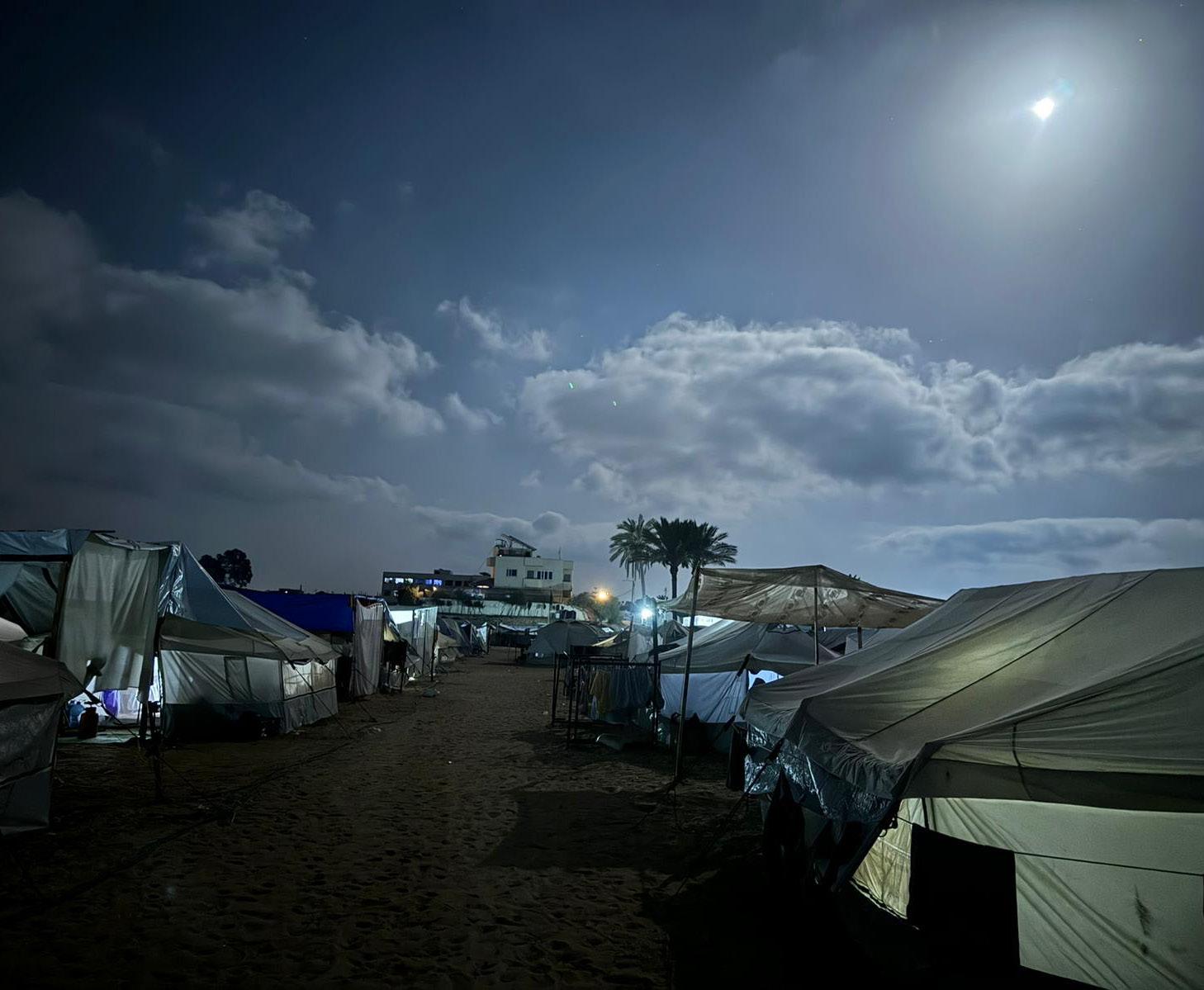
“ After nine months of displacement, I can say home is where I can feel safe. Home is where I can sit, sleep, talk and cook freely ... Home is where I open the door to nd my mother waiting for me. Home is where my memories are. Home is what I left on the 13th of October.
to $5000 since the war began.
“[Ahmed’s] apartment building was bombed early on,” May said. “She and her mother and two brothers lost everything and had to start moving … they [have been] pretty much refugees in their own country [since] late October.”
Ahmed and her family left their home on Oct. 13 after it was bombed. ey ed to Rafah, a city on the southern border of the Gaza Strip, where they were set to evacuate into Eygpt on May 7. On May 6, Israel told Palestinians stationed in Rafah to evacuate. On May 7, the day Ahmed was set to cross the border, Israel launched a ground attack on the city.
e border closed before Ahmed’s name was called.
“I have experienced so many wars, but I have never imagined that I might leave my home and my city,” Ahmed said. “… We didn’t have much time, and we had to put our whole life in small bags.”
Ahmed and her family ed Rafah to Mawasi Khan Younis and have continued to live out of bags and o of donations for nearly a year.
De ning home
Ahmed has always been a teacher. Before the war, Ahmed worked as an English teacher for the United Nations Relief and Works Agency for Palestine Refugees (UNRWA). She was meant to sign a xed-term contract with the agency in October 2023, before the war began.
Ahmed told the Old Gold & Black she nds comfort in remembering her time at Wake Forest.
“I always think about my time at Wake Forest and the U.S.,” Ahmed said. “… Whenever I want to feel happy, I open the studio app and look at my pictures. During this time I felt that I owned the world.”
With the majority of schools in Gaza destroyed, and the remaining ones being used as shelters, Ahmed’s post-war future remains unclear. For now, though, escaping the heart of the war with her family is her main goal.
Funds continue to be raised for Ahmed and her family — hoping to give them a way to start a new life. Escape will be a cause for celebration, but also a loss for the family as they leave their only home.
As Ahmed and her family continue to survive together, they see a Gaza they do not recognize — and mourn the Gaza that they lost nearly a year ago.
“A lot of ideas and beliefs have changed during this war. One of them is the idea of home,” Ahmed said. “Earlier I thought that home is where my family is, especially [since] I lived one year abroad, but war has changed this idea.”
She continued: “After nine months of displacement, I can say home is where I can feel safe. Home is where I can sit, sleep, talk and cook freely. Home is where I gather with my family and friends. Home is where I can have my personal space. Home is where I open the door to nd my mother waiting for me. Home is where my memories are. Home is what I left on the 13th of October.”
PAGE 10
THURSDAY, OCTOBER 10, 2024
Mia Springer, spriml21@wfu.edu
Addison Schmidt, schmac21@wfu.edu
ADDISON SCHMIDT Environment Editor
Hurricane Helene wreaked havoc in western North Carolina, eastern Tennessee and upstate South Carolina over the weekend after making landfall along the Gulf Coast of Florida on ursday night. e storm rapidly swept through the southeast and left devastating ooding, landslides, road closures and widespread power outages in its wake.
e storm’s death toll stands at 130 people, and the number is expected to rise as hundreds remain missing. On Tuesday morning, the death toll in North Carolina exceeded 40 people, according to Blue Ridge Public Radio. As of publication, over 378,000 active power outages have been reported in North Carolina, primarily in the western part of the state, and temporary Starlink cell towers have been installed in some locations. Hundreds of roads remain closed, and the North Carolina Department of Transportation (NCDOT) has urged drivers to refrain from all non-emergency travel in western North Carolina. Recovery e orts have begun in North Carolina, and the federal government has approved a Major Disaster Declaration for 25 counties and the Eastern Band of Cherokee Indians. is declaration allows Federal Emergency Management Agency (FEMA) aid to be allocated to the region. Search and rescue teams from 18 states are on the ground, and over 400 North Carolina National Guard members have been deployed.
In Winston-Salem and Forsyth County, dozens of nonpro t organizations, businesses, schools and churches have set up drop-o donation locations, initiated fundraising e orts and provided volunteer assistance to a ected areas. In an e ort to help raise awareness for relief e orts, the Old Gold & Black has compiled a list of local businesses and non-pro ts in Forsyth County donating proceeds or hosting supply drop-o s and events.
Wake Forest Athletics is accepting drop-o donations at the following sites:
• Manchester Athletic Center Lobby
• SSPC Lobby – near the Deacon Statue
• McCreary Tower, 3rd oor
• Bridger Field House, 1st oor
Collecting: trial-sized toothpaste, toothbrushes, deodorant, bar soap, tampons/pads, diapers, wipes, socks, paper towels, buckets, rags, bleach, disinfecting wipes, coolers, batteries, beef jerky, peanut butter, fruit pouches, baby food, ashlights, bottled water and shelf-stable items that don’t require water.
Wake Forest Department of Music:
Accepting donations until Friday, Oct. 11 at 4 p.m. in the Deparment of Music o ce in Scales M309/M310.
Collecting: sting kits, bug spray, sunscreen, unworn socks, water and sports drinks, baby food, formula, diapers, baby wipes. pet food, toiletries, sanitation items, hand sanitizer, cleaning supplies, feminine hygiene products, heavy duty work gloves, trash bags, plastic utensils, manual can openers
Chaplain’s Emergency Fund:
Wake Forest University is calling for donations to the Chaplain’s Emergency Fund to help students, faculty and sta impacted by Hurricane Helene. Donations can be made online.
Pro Bono Project at Wake Forest University School of Law:
Accepting donations in the law school commons.
Collecting: crackers, peanut butter, jelly, tuna packets, pop-top canned meat, pop-top canned vegetables, poptop canned fruit, dried fruit, dried milk, baby formula, manual can openers, feminine hygiene products, diapers (baby and adult), hand sanitizer, bleach wipes, trash bags, utility gloves, batteries, ashlights and matches.
e Pro Bono Project at the Wake Forest University School of Law is also urging donations to Hope Mill Inc., Mercy Chefs and the WNC Regional Livestock Center.
Local businesses donating proceeds e Good Cakes
A ra e to win an eight-inch milk-and-cookies dome cake is being held through Friday, Oct. 9. All proceeds will be donated to recovery e orts in western NC. Ra e tickets can be purchased by Venmoing $5 to @thegoodcakes. Pickup at Sayso Co ee, 15 Brookstown Ave., WinstonSalem on Saturday, Oct. 12
Native Root (400 S Green St., Winston-Salem)
50% of proceeds from the Fireweed Dinner on Wednesday, Oct. 9 will be donated to World Central Kitchen. Tickets can be purchased online.
Local supply drop-o locations
Foothills Brewing Tasting Room (3000 Kimwell Dr., Winston-Salem)
Collecting: bottled water, personal hygiene items, feminine hygiene products, non-perishable food, dog/cat food & supplies, diapers/wipes, baby formula, blankets/sleeping bags, cleaning products, batteries & ashlights, reusable bags/trash bags, phone charger, camp stoves & fuel, clothing & shoes and Tylenol/ibuprofen
Winston-Salem Association of Realtors (195 Executive Park Blvd., Winston-Salem)
Collecting: baby formula, diapers, towels, blankets, pillows, toilet paper, soap, shampoo, dog/cat food, cleaning supplies and feminine hygiene products
Synergy WS (905 Broad St. Unit 113, Winston-Salem)
Collecting: non-perishable foods, baby formula, diapers and baby wipes, feminine hygiene products, heavy duty work gloves, cleaning supplies, plastic sheets and tarps, socks of all sizes (unopened), toothpaste and toothbrushes, plastic utensils, manual can openers and trash bags (13 gallon)
Fiddlin Fish Brewery, Celestial Wellness and Broad Branch Distillery (772 Trade St. NW, Winston-Salem)
Collecting: non-perishable food items and bottled water
Forsyth Humane Society (4881 Country Club Rd., Winston-Salem)
Collecting: cat food, dog food, puppy food, kitten food, cat litter, pill pockets, slip leads, clear storage totes, baby diapers, baby wipes, water and feminine products. Donations can also be made via their Amazon Wishlist.
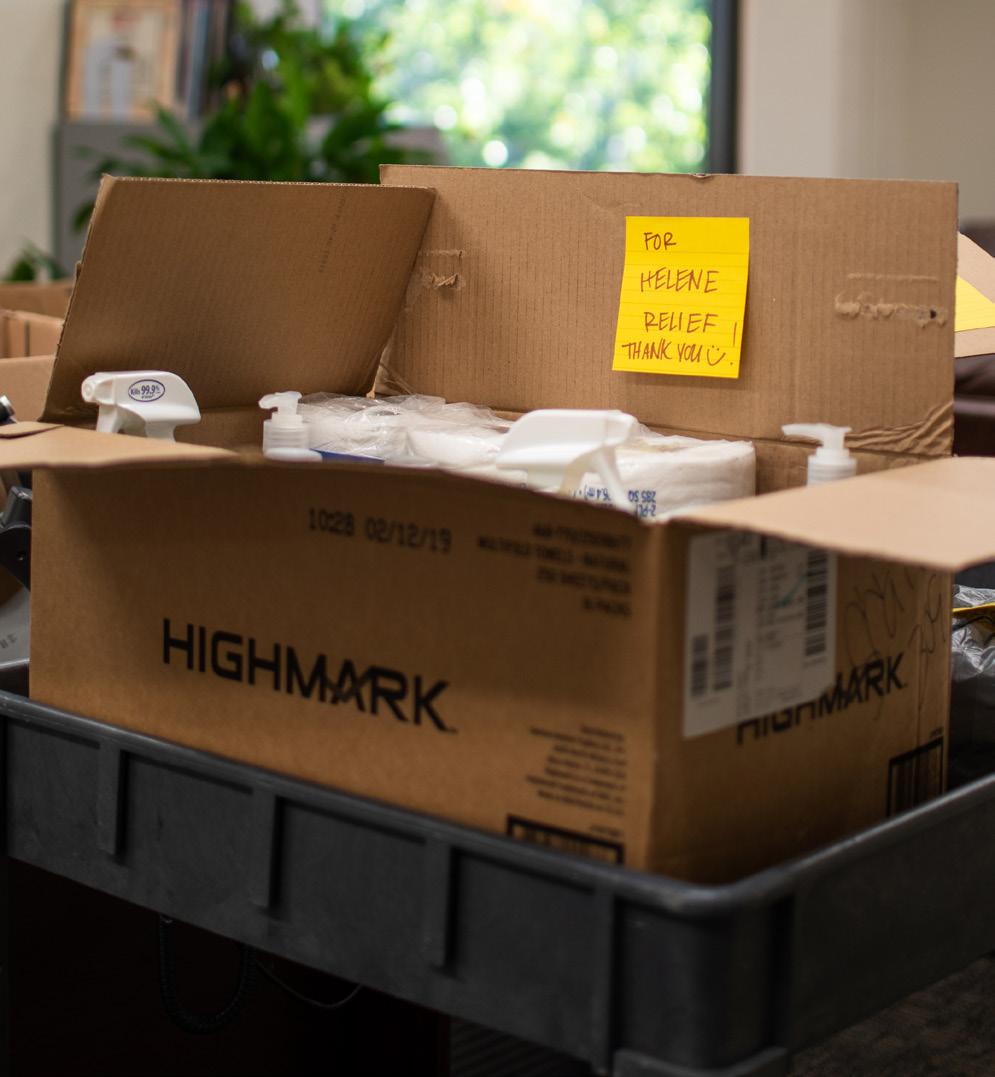
Wake Forest Athletics Department has set up donation bins around campus.
9 a.m.-5 p.m. daily
Collecting: water, non-perishable goods, toiletries and cleaning supplies
Howlin’ at the Moon Dog Bakery (1151 Canal Dr. Ste. 103, Winston-Salem)
Collecting: clothing, paper towels, toilet paper, blankets, towels, canned foods, water, batteries, rst aid, diapers, baby formula, dog and cat food and cat litter
Kernersville Fire Station 42 (180 NC Highway 66 S, Kernersville)
8 a.m.-7 p.m. any day
Collecting: storage totes, tarps, brooms, box fans, 5 gallon buckets, Tyvek suits, ear plugs, N95 masks, goggles, gloves, trash bags (13 gallon or contractor bags), bleach, cleaning supplies, water, sports drinks or hydration packets, non-perishable foods, baby wipes, diapers (children and adult), baby formula, toilet paper, paper towels, plastic utensils, manual can opener, laundry detergent, toothbrushes, toothpaste, toiletries/sanitary products, pet food, bug spray, hand sanitizers, feminine hygiene products, socks, solar chargers and battery banks
Kernersville Town Hall (134 E Mountain St., Kernersville)
8 a.m.-5 p.m. weekdays
Collecting: storage totes, tarps, brooms, box fans, 5 gallon buckets, Tyvek suits, ear plugs, N95 masks, goggles, gloves, trash bags (13 gallon or contractor bags), bleach, cleaning supplies, water, sports drinks or hydration packets, non-perishable foods, baby wipes, diapers (children and adult), baby formula, toilet paper, paper towels, plastic utensils, manual can opener, laundry detergent, toothbrushes, toothpaste, toiletries/sanitary products, pet food, bug spray, hand sanitizers, feminine hygiene products, socks, solar chargers and battery banks.
Contact Addison Schmidt at schmac21@wfu.edu
Continued from Page 1
roughout the region, limited cell service has made it di cult for people to get in contact with friends or family members, particularly in remote areas. Loading pictures or videos is nearly impossible for most, and the local National Public Radio (NPR) a liate station, Blue Ridge Public Radio, has even launched a text-only version of its website to make coverage more accessible.
Sophomore Zaina Singh, who moved to Asheville ten years ago, was supposed to go home last weekend to see her parents but was unable to because of the storm. As of Wednesday, Oct. 2, Singh’s parents still had limited cell service, but she was able to call them on Tuesday.
“Every part of the town that I knew, where I drove through in my 10 years of living there — it’s all gone,” Singh said. “Anyone who was in Asheville during the hurricane didn’t have cell service, so they didn’t really know what was going on. My parents didn’t know the level of destruction that had just happened, so they were telling me to come home, and I was like ‘I can’t come home, look at the news.’”
Severe damages leave several areas unrecognizable
On Friday morning, Vickory’s parents called to let her know that they wouldn’t be able to drive to WinstonSalem and that they were going to walk to her grandparents’ home to check on them. When Vickory’s parents arrived, they found out that her grandparents’ house was destroyed. A tree had collapsed on top of the roof, but thankfully they were able to escape safely.
According to a preliminary report from AccuWeather, the storm’s damages could total between $225 and $250 billion. e gure accounts for the loss of life, infrastructure repairs, healthcare costs, power outages, business and travel disruptions, a decrease in tourism and the loss of technology, including renewable energy.
Singh’s parents own restaurants and gas stations in Asheville. She said that her family’s restaurants seem to be ne, but the gas stations are “completely gone.”
Widespread outages and devastating damages have caused panic for many, according to Vickory.
“My mom said it is like a zombie apocalypse; everyone is in the streets crying and asking if they can get in touch with their kids or parents,” Vickory said.

Being away from home amidst such an enormous tragedy has been di cult for many of the a ected students. “ ere’s this guilt inside of me, and also this sadness and frustration. Because what can I do? I’m so far away,” Wood said.
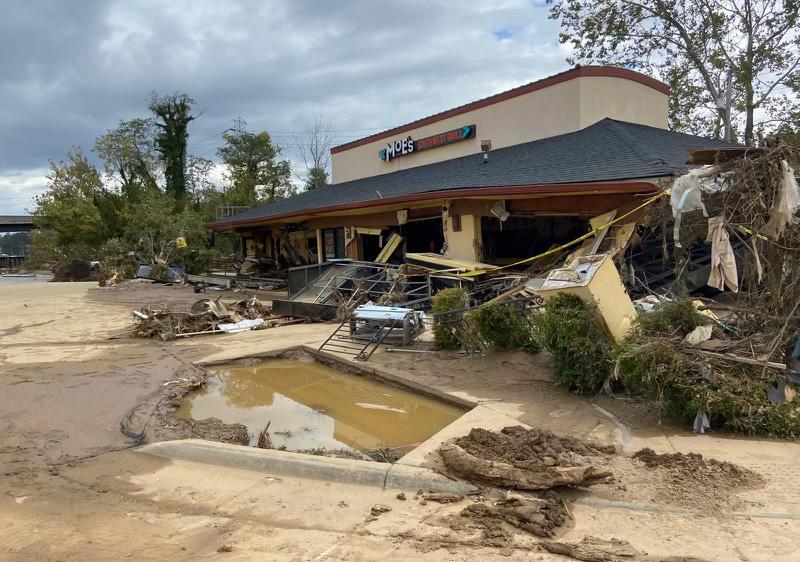
Singh felt similarly.
“I think [my parents] just don’t want me to worry about it. ey want me to focus on school,” Singh said. “It’s still in the back of my mind, [and] I’m very fortunate that my family’s safe [and] my house is ne … and I know a lot of people can’t say the same thing.”
At Wake Forest, students from Asheville said that many of their friends and peers have reached out to them, but they’ve struggled to convey the enormity of the situation.
“ e community has been really great [at Wake Forest]. I’ve gotten [an] overload of messages from friends, people in a lot of di erent sororities [and] people who I honestly am not close [with] at all,” Wood said. “I’m so glad [that I have received] a lot of overwhelming support, which also reassures [me that] people are aware of this and [that] it’s not a hidden thing.”
“I’m not really looking for [people’s] pity … [but] this is something that no one who isn’t from [Asheville] is ever going to understand,” Singh said. “I want people to know that it’s gonna take a long time for kids to recover from this and for this to not be in their heads 24/7.”
Despite the isolation that comes with being away from home amidst such a devastating tragedy, Singh has found comfort on campus by talking with other students from Asheville. She said that lots of people have posted about ways to help on social media, but that most of them are from western North Carolina and other a ected areas.
“I just want [other students] to not forget about [Hurricane Helene]. I don’t want it to be one of those things where you post about it on social media for a week, and like, next week everyone’s moved on to the next thing,” Singh said. “ is is something that’s gonna take months and months to rebuild and restore.”
Contact Addison Schmidt at schmac21@wfu.edu
Contact Mia Springer at spriml21@wfu.edu
12 THURSDAY, OCTOBER 10, 2024
Virginia Noone, noonvc21@wfu.edu
e views expressed in all opinion columns represent those of the article’s author, not the opinions of the Old Gold & Black Editorial Board
HARRY FIFIELD Contributing Writer
e recent debate between Presidential candidates
Vice President Kamala Harris and former President Donald Trump was rife with contempt from both sides. What the debate lacked in concrete policy and speci c plans for the future was made up for with insults and degradation of personal character. e most surprising fact, however, was the complete lack of surprise from viewers. is was pretty much expected.
In today’s day and age, political gures are de ned less and less by policy and, rather, more and more by personal character. e debate oor on Sept. 10 displayed one candidate as seemingly devoid of policy, aside from a rm stand on reproductive rights, and one candidate whose platform is almost solely based on overzealous fearmongering and remarks made, seemingly, for the sole purpose of going viral on Twitter. All this being said, charisma voting is really nothing new.
During the Reagan-Bush era, the “Would you get a beer with them?” hypothesis seemed to determine ballots just as much as policy did. People have always voted for who they like. However, politics has never been as harmful or as polarizing as it is today. e “boring politician” is a gure that is necessary for a functioning democracy, yet is something that is sorely lacking today.
e rst nationally televised presidential debate took place between Richard Nixon and John F. Kennedy in September of 1960. Despite the same medium, that debate was strikingly di erent from this past week. Candidates took opportunities to compliment each other and their policies. ey often agreed on speci c issues, and when they disagreed, it was out of di erences in policy, not personal attacks.
Nixon himself stated during this debate that the two candidates were like-minded in their goals for this country, it was simply the means to that goal that di ered. Compare this to the past week’s debate — things could not be more di erent. Politics are not what they once were, and this is for a few key reasons.
ere are now more voices than ever clamoring for their own personal or group needs to be addressed. e modern-day liberals, the self-touting protectors of welfare and DEI, have to pack myriad social stances under one umbrella. If you support progressives for their stance on reproductive rights, you now have to support their environmental funding and their swollen welfare programs or foreign relief e orts.
Issues have become so split along party lines that each party has to cram far too many stances under one candidate. ere are a million needs, and there are only two groups to cater to those. Modern-day politicians are now forced to take stances on issues that were less politically oriented decades previous. While this causes confusion and complication, it is not inherently a bad thing.
More voices with more issues is not necessarily indicative of a country failing, but of more voices being platformed. Presidents like JFK were able to campaign on issues almost exclusively catered to the middle-class white families of America, and it worked. Modern-day America has a larger platform for diverse voices than it ever has, but it also makes party agendas a confusing heap of issues.
“
Turning o a presidential debate because of anger or fear is probably representative of a deeper issue with our nation.
For this reason, modern-day campaigns have been largely stripped of policy so as not to alienate key demographics needed to win an election. Harris pushes for a drastic cut in taxes for the middle class, and in doing so, risks losing the vote of voters keen on expanded welfare. e modern-day MAGA GOP is but a shell of its former self. Bureaucratic policy has been reduced to slogans used to whip radical supporters into a fearful frenzy. Support for domestic industry has transformed into immigration fearmongering. “Build factories” has become “build a wall.”
Turning o a presidential debate because of anger or fear is probably representative of a deeper issue with our nation.
is confusion leads to debates boiling with sizzle, but the viewer is left sans let. Politicians, lacking in substantial policy, have to resort to character at -
tacks and pandering. Harris can ill a ord to attack Trump’s radical stances as she risks opening up her own agenda to attacks on its clear dearth of real substance.
Politics is not a place for personal expression or radical action. A boring government is usually indicative of a prosperous society. Turning o a presidential debate because it’s lulling you to sleep probably means that the country is doing ne. Turning o a presidential debate because of anger or fear is probably representative of a deeper issue with our nation. Trump has become almost a caricature of himself, but in a world of confusion en masse, his simplicity is a relief to many.
Ironically, both candidates are doing an excellent job of representing their parties. Current election chaos is representative of our own chaotic country. Political parties must return to platforms constructed from clear and simple policy, and candidates need to campaign on this platform alone. Government needs to be boring, and candidates need to express their individuality through other means, but charisma is important, and likeability wins elections. A candidate passes the beer test by being likable yet also bland. Bring back boring politics and bring back boring politicians.
Contact at
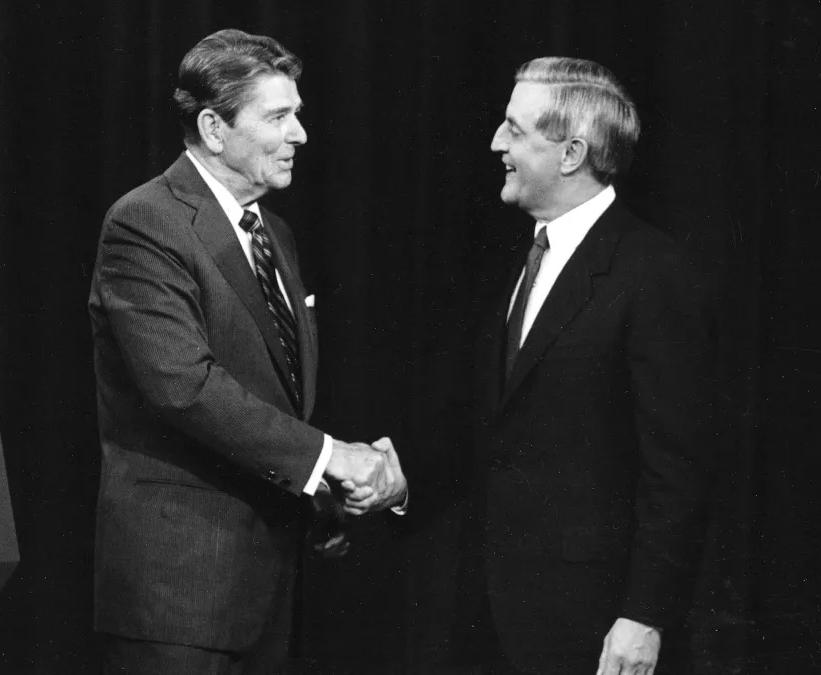
HASAN PYARALI Class of
is past week, we witnessed yet another attempt by President Susan Wente to silence Palestinian voices and deny the fundamental right to free speech on campus.
I am old enough to remember when Wake Forest University hosted George Bush, who myself and many people of conscience consider a war criminal and responsible for the deaths of hundreds of thousands of Iraqis and thousands of U.S. military personnel. ough I disagreed with his invitation, he was allowed to speak, and students had the opportunity to listen to what he had to say.
Yet Wente has decided to cancel a speaker who has not committed war crimes but who has led an academic life dedicated to highlighting injustices throughout history. Why was she silenced? It is clear to me it is because she is Palestinian and because her
views did not align with President Wente’s broken ideology.
You might now ask yourselves: surely Wente must have canceled other politically charged events on Oct. 7, right? e answer is no. She is still allowing events to occur where supporters of Israel will likely be praising the actions of the IDF, a group responsible for the murder of 40,000 innocent civilians. is shows not only that the administration’s actions are contrary to the First Amendment, but also to their own stated principles.
I was on campus the last time Wente suppressed free speech — when she had students jolted awake at 4 a.m. by police o cers threatening arrest. at is how she handled the situation then, and it’s why this announcement comes as no surprise to me.
As a proud alumnus of Wake Forest University and a former student of professors from all ve departments that would
have hosted Abdulhadi, I was taught to listen to those with whom I disagree, not to call the cops on them; to keep an open mind to new ideas, not to silence them; to stand against injustice, not to stand by silently while injustice occurs.
erefore, as an alumnus who cares deeply for the academic freedom of all current and future students, I call on President Wente and any other administrators who supported this decision to resign immediately.
If they cannot do so swiftly, I call on the faculty and board of trustees at Wake Forest University to move to dismiss Wente at once. Her administration is a threat to the University and must be removed as soon as possible.
To the many departments, faculty members and students who have led the e ort to amplify Palestinian voices: I want to thank you. ank you for standing up for what is right, even in the face of such
vile opposition. Despite yesterday’s events, please keep up the ght. Your work will be remembered in history as not only courageous but heroic, as you risk your titles to stand for justice.
I leave you with a quote that I often reect on in times of uncertainty:
“Courage is an inner resolution to go forward despite obstacles. Cowardice is submissive surrender to circumstances. Courage breeds creativity; Cowardice represses fear and is mastered by it. Cowardice asks the question, is it safe? Expediency asks the question, is it politic? Vanity asks the question, is it popular? But conscience asks the question, is it right? And there comes a time when we must take a position that is neither safe, nor politic, nor popular, but one must take it because it is right.” — Martin Luther King Jr.
Contact Hasan Pyarali at hpyarali24@alumni.wfu.edu
This anniversary marks a day of mourning for many communities
BARRY TRACHTENBERG
Michael
H.
and
Deborah Rubin Presidential Chair of Jewish History
e attacks on Dr. Rabab Abdulhadi, supported by powerful organizations that spread anti-Palestinian hate such as the Israel War Room, the National Review, Jihad Watch, and the Campus Reform Network and shamefully promoted by too many in our campus community, signal an alarming rise in Islamophobia, racism and sexism. Such rhetoric has no place in society or at our university. e social media campaign and petition against her visit were steeped in unfounded accusations and disgraceful smears that she is a supporter of terrorism and an antisemite. It’s even more tragic that our campus newspaper chose to reprint it without rigorous fact-checking and that our university administration buckled under the pressure of those voices. My e orts to alert university authorities, including campus police, events planning, and administrators in the o ce of the Dean of Students, O ce of Diversity and Inclusion, and Campus Life to the danger of these attacks were either dismissed or ignored. ese actions have made our cam-
pus more hostile, fostering an environment thick with fear, hatred and bigotry.
Oct. 7 carries deep signi cance, especially within Jewish communities, including my own. But we must acknowledge that this date also signi es profound loss for Palestinians who are in the midst of what has been widely considered to be a plausible genocidal attack by Israel.
Grief on this day does not belong to any single group.
Let’s confront the damaging, yet repeated, notion that the pain of Oct. 7 exclusively belongs to one community. Framed as the largest killing of Jews since the Holocaust, this statement carries heavy historical weight, yet it overlooks a vital truth: the period since Oct.7 has marked the largest killing of Palestinians in their history. We cannot separate these realities. A staggering death toll, which is now estimated to be over 40,000, encompasses not just Israeli lives but also the lives lost in Gaza, the West Bank and now Lebanon. Everyone is grieving, and all losses deserve acknowledgment.
At Wake Forest, our role is not only to provide a space for individuals to process their grief but also to empower our community to investigate and engage with con-
temporary tragedies. Last year, we re ected on the anniversary of Russia’s invasion of Ukraine — a war that is reshaping global politics and resulting in unimaginable suffering. If we can have those discussions, we absolutely must allow for a thoughtful exploration of the events of Oct. 7. Failing to engage with these issues simply to avoid upsetting advocates of Israeli violence contradicts the very mission of our university. To suggest that discussing or exploring Oct. 7 somehow “celebrates” it is o ensive, reductive and damaging. is argument implicitly denies the humanity of Palestinians, Muslims and Arabs on our campus, asserting that their grief is less valid. Such reasoning not only erases their voices but also treats their lived experiences as negligible. It perpetuates a dangerous narrative that dissenting perspectives are somehow a threat to the dominant story.
is misdirection also serves as a distraction from the larger problem at hand. e controversy surrounding the now-canceled Oct. 7 lecture was not just about the date but part of a concerted e ort to silence Palestinian voices. Abdulhadi, a respected scholar of Palestinian society, has faced relentless opposition whenever she is invited to speak at universities. Her experiences at
other campuses where similarly groundless, racist attacks have occurred make it painfully clear that, as pro-Israel factions lose the war of ideas and public opinion, they are trying to rede ne the boundaries of permissible discourse.
As a scholar of the Nazi Holocaust, I staunchly believe in the power of education to foster understanding amid profound pain. Oct. 7 is a day marked by immense tragedy, but it does not belong solely to any one group. We must create an environment where everyone can mourn, re ect and engage in the di cult conversations that inevitably follow. Only then can we aspire to move forward — not as adversaries, but as a community that values the lives and losses of all its members.
If we truly uphold the ideals of academic freedom and the pursuit of knowledge, we must ensure that scholars like Abdulhadi can speak freely and that all voices, not just the loudest, are heard. e future of our campus community depends on our ability to embrace complexity, confront uncomfortable truths and acknowledge varied narratives.
Contact Barry Trachtenberg at trachtbc@wfu.edu
DEAN FRANCO
Winifred W. Palmer Professor in Literature
e decision by the provost and president to cancel the lecture by Dr. Rabab Abdulhadi is an astonishing violation of academic freedom at Wake Forest. e lecture was initiated and organized by members of the Humanities Institute faculty seminar on Genocide and Memory Studies, including faculty with expertise on the topic from four di erent departments. Faculty seminars convene to conduct interdisciplinary research on a selected topic, and seminars in their second year — as this one is — typically direct inquiry toward urgent
academic, social and moral problems. Inviting a leading, if controversial, scholar to engage in the Genocide and Memory Studies seminar is appropriate to the seminar’s aim of creating new knowledge. e seminar is co-led by our university’s leading historian of the Holocaust Dr. Barry Trachtenberg and by a renowned scholar of public history Dr. Lisa Blee. e seminar and the speaker event was vetted and approved by faculty committees and department heads. In other words, the seminar and the speaker event exemplify faculty governance and peer-reviewed academic excellence.
e accusations about Abdulhadi are
easily dispatched. Following the links in the letter published in OGB, for instance, simply takes readers to other websites that make the same accusations, with little attempt to substantiate or contextualize them. Meanwhile, our provost and president accept the accusations and lean into the tautology of cancel culture. We call her a terrorist sympathizer therefore we are terrorized; we claim we may be physically harmed therefore we are not safe. at logic is replicated in the provost’s and president’s claim that the event will be “inherently contentious” and that it will “stoke division.” In truth, the fundamental division that is stoked — and the one
every academic at Wake Forest should be concerned about — is between freedom of academic inquiry and expression on the one hand and administrative capitulation to smear campaigns on the other hand. It’s a dangerous precedent. Indeed, in over 20 years of teaching at Wake Forest I’ve never seen anything like it, and I call on our administration to publicly explain the process by which they chose to block the scholarly work of our faculty.
Sincerely, Dr. Dean Franco
Contact Dean Franco at francodj@wfu.edu
AIDAN OLISS Contributing Writer
In today’s society, where technological advancements and economic pressures dominate the educational landscape, the value of humanities courses has often been called into question. However, far from being obsolete, the humanities remain a crucial component in shaping well-rounded, adaptable individuals who are prepared to navigate a complex, evolving world.
Despite the emphasis on Science, Technology, Engineering, and Mathematics (STEM) education as a driver of economic growth, humanities courses o er skills that are not only remunerative but essential for personal and professional success. rough their ability to foster critical thinking, ethical awareness and soft skills, the humanities contribute signi cantly to developing individuals who can thrive in today’s economy.
One of the most remunerative aspects of humanities education lies in the cultivation of soft skills. Contrary to the belief that technical skills alone drive success, many employers value the broad, exible mindset that comes from a liberal arts education.
According to Forbes, “what we consistently hear from employers is that the di erence between an adequate employee and a great one lies not in technical skills… but in the so-called ‘soft skills’ that a classical liberal arts education helps hone.” is demonstrates that, while STEM disciplines may teach technical pro ciencies, humanities courses equip students with the interpersonal skills necessary to navigate complex work environments and solve multifaceted problems.
Moreover, the humanities promote intellectual curiosity and critical thinking, qualities that are essential in a rapidly changing world. A survey by the Association of American Colleges and Universities found that skills historically represented in a liberal education, such as independent thinking, exibility of mind and collaborative problem-solving, are more important to employers than a speci c undergraduate major.
e ability to think ethically and critically about the consequences of technological advancements is another area where humanities education proves bene cial. As society becomes more reliant on technology, there is a growing need for individuals who can navigate the ethi-
cal challenges that arise from these developments. e humanities, through their emphasis on ethics, literature, history and philosophy, provide a framework for understanding the human condition and the impact of technological progress on society. As eo D’haens argues, “the humanities are necessary to determine the ethical boundaries of what technological innovation may or may not bring about, for the individual, for the collective, for humanity, for nature, for the planet.”
While some politicians and institutions have sought to marginalize the humanities in favor of STEM disciplines, this approach fails to recognize the broad, longterm bene ts of a balanced education. In 2011, former Florida Governor Rick Scott suggested reallocating funding away from liberal arts programs like anthropology in favor of degrees that o ered better job prospects.
However, this narrow focus on economic returns overlooks the fact that humanities graduates often possess skills that are highly transferable across industries. Degrees in the humanities provide individuals with the tools necessary to succeed in diverse elds, from business to education to government. In this sense, the humanities not only prepare students for speci c careers but also cultivate a lifelong ability to learn, adapt and grow— qualities that are increasingly important in an economy where job roles are constantly evolving.
Furthermore, cutting funding for humanities programs risks making education more exclusive and limiting the opportunities available to students. As universities like West Virginia eliminate programs in world languages and creative writing to address budget de cits, they reduce the diversity of academic pursuits available to students. is narrowing of academic options limits students’ ability to pursue their passions and reduces the breadth of skills they can develop.
In contrast, a balanced education that includes both STEM and the humanities ensures that students can pursue a wide range of interests while acquiring a broad set of skills. is holistic approach to education prepares individuals to be more creative, adaptable and capable of nding success in various careers.
e humanities also play a crucial role in fostering societal cohesion and promoting ethical decision-making.
rough literature, history and the arts, humanities courses allow individuals to engage with diverse perspec-

"Degrees in the humanities provide individuals with the tools necessary to succeed in diverse fields, from business to education to government"
tives and cultures, fostering empathy and understanding. is ability to connect with others and navigate complex social dynamics is increasingly important in a globalized world. By providing students with the tools to think critically about their place in society and the ethical implications of their actions, the humanities contribute to the development of individuals who can positively impact their communities and the world at large. e humanities remain a vital component of education in today’s society. rough their emphasis on soft skills, ethical awareness and critical thinking, humanities courses prepare students for success in a wide range of careers. Rather than being sidelined in favor of STEM, the humanities should be recognized as a crucial part of a well-rounded education that promotes creativity, adaptability and ethical responsibility. By fostering a synergy between the humanities and STEM, society can ensure that students are equipped with the skills necessary to thrive in today’s economy and beyond.
Contact Aiden Oliss at olisar23@wfu.edu
SHANI SCHWARTZ Contributing Writer
e market price to attend Wake Forest University is $91,266 per year; that’s a total of $365,064 if you graduate in four years, excluding nancial aid. Now imagine spending $365,064 and not being prepared to land a job post-graduation. Nobody wants that to be them, and neither do their wallets. Planning for the future is critical.
Careerism is de ned by the Merriam-Webster dictionary as “the policy or practice of advancing one's career often at the cost of one's integrity.” For a college student, this means selecting a major that will land solid job prospects post-graduation, participating in clubs that relate to your chosen major/career path, and perfecting your resume to land the perfect summer internship. College is optional. Its purpose is to prepare and better qualify students for the workforce, not to be an extension of high school. While it is bene cial to take time to explore new interests and nd academic passions, students and their families are not paying $91,266 per year to receive a diploma reliant on going to graduate school,
another high cost, to land a job.
However, college students have taken future-focused mindsets too far. e obsession over joining pre-professional clubs and fraternities, attending every networking event possible, and majoring in subjects solely based on what will provide the most worthwhile and successful career has turned college students into robots and left intellectual curiosity in the dust. Students spend signicant amounts of time out of the classroom stressing to be one of the few selected to be a part of exclusive pre-professional fraternities, equating a bid from Alpha Kappa Psi to a job o er on Wall Street. e following hours of their day will be spent scrolling through LinkedIn to see what everyone else is up to.
Careerism culture suggests that only high-paying jobs in business and STEM are worthwhile career paths, resulting in a signi cant decline in humanities majors, and a signi cant increase in miserable students. e mental health crisis on college campuses can be largely attributed to the ultra-competitive, overly obsessive careerist environments.
Going into college I envisioned myself taking an array of electives with names unimaginable to my high school
self. My dreams were then quickly squashed during registration when I realized my engineering classes and required freshman courses took up all 17 hours, leaving no room for anything else. I then got onto campus and was immediately bombarded with yers advertising every STEM and engineering club imaginable, and tools for nding my rst summer internship. All I wanted to do was play club basketball and spend my summer working at a sleepaway camp, but the overwhelming careerism suggested that would leave me far behind all of my peers.
College tuition should not be wasted to the point that graduate school is the only possible next step, but it also should not be wasted on a miserable, solely career and future-focused four years. College is just as much a life experience as an academic one, and it should be treated as such.
Learning to balance your present life with the plans for your future is a much more valuable skill than learning how to curate the best possible LinkedIn pro le.
Planning ahead for success is vital; engrossing in careerism is not.
Contact Shani Schwartz at schwsr24@wfu.edu
Sean Kennedy, kennsm21@wfu.edu Andrew Braun, brauar23@wfu.edu
WILL KUNISAKI Staff Writer
On the evening of Oct. 3, No. 4 Wake Forest (9-2-2, 4-1-1 ACC) brought the energy against reigning national champion No. 6 Florida State (7-1-2, 2-1-1), dominating the match with a statement 4-1 victory.
Wake Forest currently holds second place in the Atlantic Coast Conference (ACC) standings with four regular season contests left on the schedule.
A well-placed ball from senior midelder Nikayla Small set up a one-on-one run out for Emily Murphy in the 24th minute. Murphy made a quick move and threaded the ball into the bottom left cor-
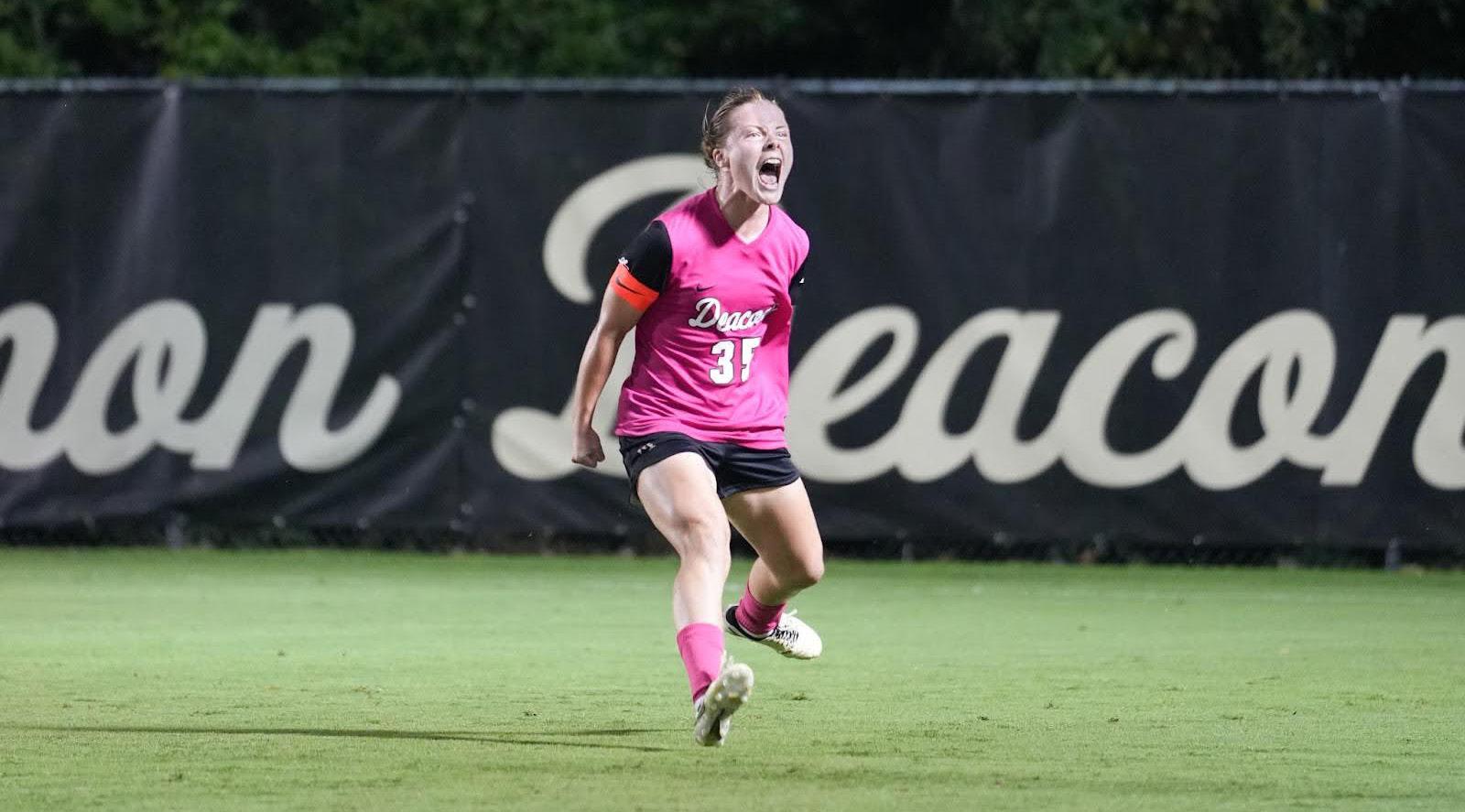
Senior forward Emily Murphy (35) celebrates after an assist in Thursday evening’s match against Florida State.
ner of the net, giving the Demon Deacons a 1-0 lead.
Five minutes later, senior mid elder Emily Morris blew by a Seminole defender with a sharp cut to the right on the edge of the box. She took a few steps and kicked a rocket which curved into the top right corner of the goal, doubling the lead. Senior defender Kristin Johnson recorded the assist.
Murphy nearly scored her second goal in the 38th minute. Her shot bounced to senior mid elder Anna Swanson, who collided with a Seminole defender and pushed an attempt wide to the left.
Just fteen seconds into the second half, the Seminoles got onto the board. Forward Kameron Simmonds jumped to catch her own header, squeezing the ball into the net from a few feet out.
Emotions ared in the 51st minute, leading to a brief timeout after some pushing and shoving near the Wake Forest bench. No penalty cards were assessed to either team.
e Demon Deacons regained their two-goal advantage in the 56th-minute.
Junior forward Caiya Hanks outran her defender into the box. Murphy delivered a precise pass to Hanks, who scored with a defender all over her. Hanks leads the
Demon Deacons with six goals and 17 total points on the season.
In the 64th minute, Small made the score 4-1 with a spectacular goal. She took two dribbles to her left and red an o -balance shot into the back of the net.
Fans erupted in the 84th minute when freshman goalie Valentina Amaral stopped a Florida State free kick. Amaral has only allowed four goals in over 765 minutes of action.
e backline of seniors Zara Chavoshi, Laurel Ansbrow, Kristin Johnson and sophomore Sierra Sythe played the entire 90 minutes and held the Seminoles to just three shots on goal.
Wake Forest wore pink jerseys, which were auctioned o to support the Atrium Health Wake Forest Baptist Cancer Health Equity Patient Care Fund.
e Demon Deacons are unbeaten in 15 consecutive home contests, breaking the record for the longest streak in program history set in the 2007 and 2008 seasons. ey have two weeks o before heading to Dallas to face Southern Methodist University (6-4-2, 2-1-2 ACC) on Oct. 19 at 7:00 p.m.
Contact Will Kunisaki at kuniwx23@wfu.edu
Wake Forest continued their good form in a concinving 2-0 win over the Eagles
TEE
JOHNSON Staff Writer
Wake Forest Men's Soccer (5-3-3, 2-11 ACC) earned a 2-0 victory over Boston College (3-3-5, 0-3-2 ACC) on Saturday evening at Spry Stadium.
“Protecting Spry [Stadium] is really important, and I thought the crowd was great tonight,” Head Coach Bobby Muuss said following the win. “ e energy was great, and the guys fed o that.”
While it was a positive day for the Demon Deacons, there were some worrying moments. Boston College came out with a good intensity and were able to string together some dangerous passes.
In the 19th minute, the Eagles pressed the Wake Forest defense with a slick attack up the middle. e ensuing shot from outside the 18-yard box was saved by a diving senior goalkeeper Trace Alphin, with his ngertips pushing the ball into the crossbar and back into play.
Wake Forest responded well to the early pressure and got themselves on the front foot, generating a urry of chances around the half hour mark. Redshirt sophomore Nico Rabiu and junior Cooper Flax each found themselves in good areas, but neither could direct their shot into the Boston College goal.
“I thought that after the rst 15 minutes the team really settled into the game,
and I thought we were able to impose ourselves on them,” Coach Muuss said.
e intense o ensive pressure continued into the latter stages of the rst half, as Rabiu found himself with another good chance. He dribbled past a few Eagles defenders, before putting his shot just wide of the right hand post.
With just two minutes remaining until half time, graduate Colin omas took a left-footed shot from the top of the 18-yard box. His shot de ected o of a defender and fell right into the path of freshman Ryan Belal, who pounced on the opportunity and gave the Demon Deacons the lead.
e Demon Deacons concluded the rst half with 12 shots and 54% possession, and had nally been able to nd a breakthrough goal in the rst half. While there were still goals being left on the eld, scoring in the rst half has been a struggle for Wake Forest so far this season. is was just the third time the Demon Deacons had scored a goal before half time this season.
e Wake Forest attack continued their impressive play into the second half, adding another 14 shots and one goal — which came from graduate Sidney Paris. Paris, who was given a good pass on the right side of the Boston College 18yard box, calmly slid his shot through the legs of the Eagles’ goalkeeper.
Eight of the 14 second half shots for Wake Forest came after the second goal, and the scoreline of 2-0 was rather generous on the Eagles. It could have been four or ve if the attack had been more clinical.
“We just keep getting better and that's the most important thing this time of year,” Muuss said. “ is was a third win in a row for Wake Forest, the best stretch of the season thus far.”
Wake Forest is now up to seven points
in the Atlantic Coast Conference (ACC) standings, closing the gap on No. 1 Pitt to just ve points. Next up for Wake Forest Men’s Soccer is a home match against Wo ord. is is the third consecutive season that the Demon Deacons have hosted Wo ord, and they will look to make it three wins in a row against the Terriers. e match is scheduled for a 7 p.m. kicko on Tuesday.
Contact Tee Johnson atjohntg23@wfu.edu
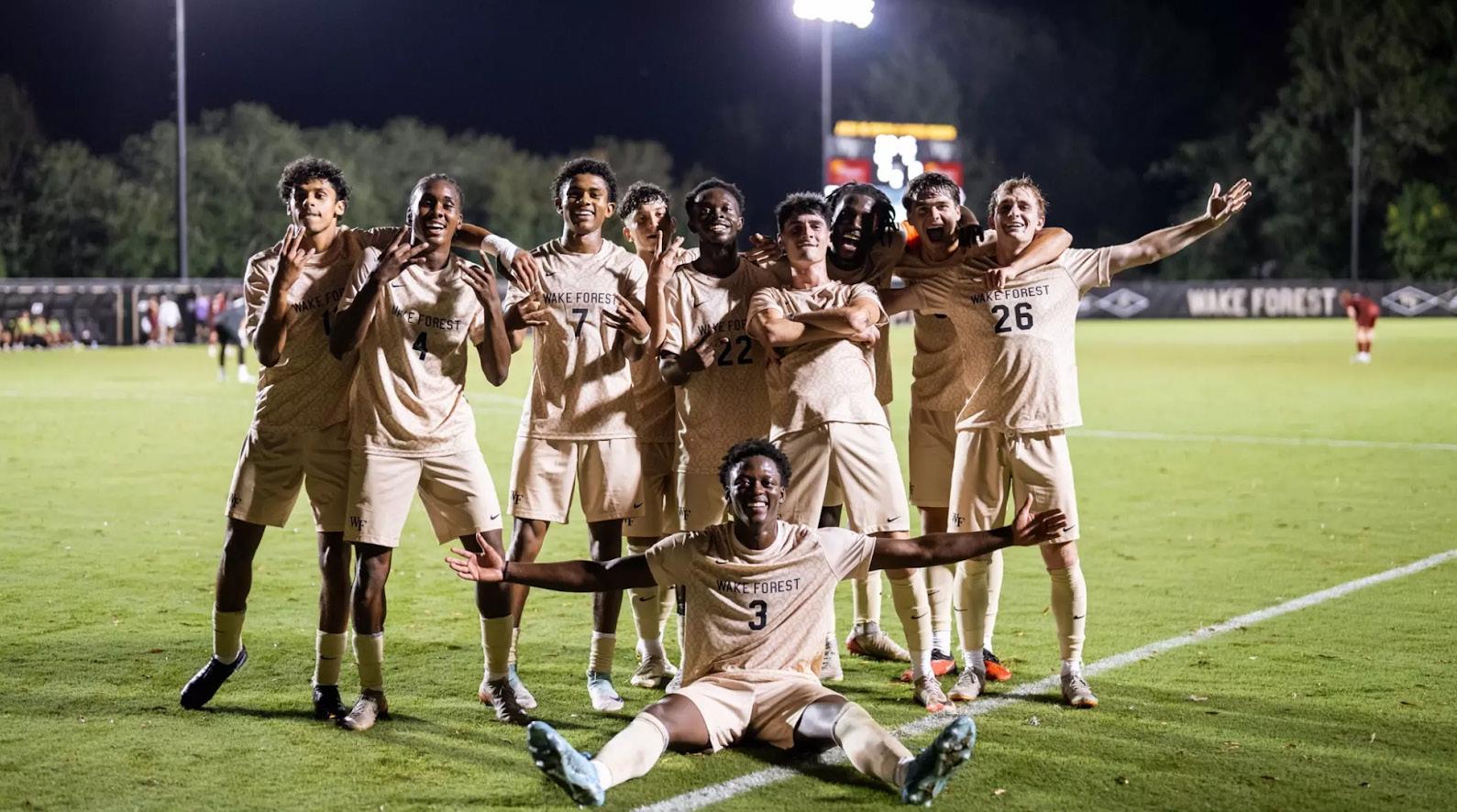
SEAN KENNEDY Sports Editor
Wake Forest needed this win.
After September included a blowout and two heartbreaking, one-score losses, Wake Forest football needed to turn over a new leaf — and they did, coming back to beat rival N.C. State, 34-30.
“It’s about freaking time,” Wake Forest Head Coach Dave Clawson said of winning a one-score game. “ at’s one of the best wins we’ve ever had, because of what has led up to this point.”
e rst defensive drive was all sorts of bittersweet for the Demon Deacons, who had a rough start with defensive back Devaughn Patterson being called for targeting early on. A few plays later, Wolfpack quarterback Grayson McCall attempted to scramble for a rst down on third and 11, was met by three defenders and su ered visible concussion symptoms after being tackled. (McCall was hospitalized and released later Saturday night, according to a post on the N.C. State Football X/Twitter account.)
“ at is one of the worst things you can see in college sports,” Clawson said of the play. “Certainly, our hopes and prayers are with him, the McCall family and all of N.C. State.”
During the play, McCall let go of the ball, falling right into the hand of Wake Forest safety Evan Slocum, who continued to run the ball cross- eld, with the play not blown dead. Slocum returned the ball 88 yards to the N.C. State two yard line.
“One of our goals this week was to start fast,” Demon Deacon safety Nick Andersen said. “We started o pretty slowly against [Louisiana-Lafayette], so to start quickly was one of our goals- and we did that.”
After Slocum returned the ball across the o ense took no time converting for a touchdown, with Bachmeier rolling out right of the pocket and Claiborne for his rst career receiving touchdown.
With McCall sidelined, the Wolfpack turned to C.J. Bailey, who had started in the two previous games. at experience paid o for the freshman, who led them to an unanswered 13 point run, including two eld goals and a touchdown pass to wide receiver Keenan Jackson.
With under three minutes in the er’s o ense then charged down the and-a-half drive that found receiver Horatio Fields snagging the ball out of the air in the endzone. In the third quarter, o on both sides. For the Wolfpack, they started with a three-and-out, however got the ball right back after Bachmeier su ered a strip sack from N.C. State line backer Sean Brown.
e next drive, Bachmeier launched an overthrown ball to Wolfpack safety Bishop Fitzgerald, rather than tight end Harry Lodge.
“We had a miscommunication on the route there, and you got to protect the ball,” Bachmeier said.
e next few minutes of play shifted the momentum of the game. A roughing the passer call allowed Bailey and running back Kendrick Raphael to take advan tage, and the latter rushed in for a touchdown a few plays later, putting the Wolfpack up three.
e Wolfpack didn’t stop there. After a Wake Forest three-and-out, Bailey found wideout Kevin Concep cion multiple times and found tight end Justin Joly for another 22-yard touchdown, putting the Demon Deacons down ten in the fourth quarter.
Wake Forest then needed con they got both. It came via a risky fourth-and-9 down scramble by Bachmeier, who rushed across the down line. Claiborne then turned on the jets himself, too, and bursted towards the pylon for six points.
When they had the chance to put the game away, the Wolfpack o ense ground to a halt. A three-andout came at one of the most inopportune times for N.C. State, allowing Wake Forest a chance to score again — to either tie or take the lead.
On a fourth-and-5 with under four minutes left in the game, Bachmeier released the ball quickly after

N.C. State rushed seven defenders, each breaking to - “Since I’ve been here, that’s probably the rst time

ANDREW BRAUN Sports Editor
After blowing out Wake Forest Football 40-6 in Winston-Salem on Sept. 14, Ole Miss Football Head Coach Lane Ki n revealed that Wake Forest had pulled out of their two-year agreement, canceling their planned visit to play the University of Mississippi in 2025.
Wake Forest agreed to pay Mississippi $750,000 to escape a nearly decade-old deal that scheduled the two schools to play at each other’s home venues in 2024 and 2025. Within days, Wake Forest then scheduled another football series with Oregon State University in what Wake Forest Vice President and Director of Athletics John Currie called the “right business decision.”
“ at’s rarely ever done,” Ki n said after playing the rst game of the two-way agreement. “I’ve never really heard of doing it, and it really puts us at a big disadvantage… It obviously wasn’t appreciated very much, them putting us in that situation.”
e “disadvantage” that Ki n spoke of is a new requirement for Southeastern Conference (SEC) programs like Ole Miss. SEC member schools currently have to schedule one non-SEC opponent in another major “Power Conference” –– or a school that is considered a “major” independent program — as part of their annual football schedules.
Having once met that criteria by scheduling a game with Wake Forest, an ACC member, Wake Forest’s “buy out” of its own contract left Ole Miss short of meeting that requirement. is is the only non-conference game that Ole Miss did not pay their opponent program to schedule this season.
While Ki n addressed the cancellation in the postgame press conference, Clawson did not indicate any knowledge of the breach. Instead, Clawson criticized Ole Miss’ defenders for “clearly opping” on multiple drives throughout the game.
But that wouldn’t keep Ki n’s frustration from becoming national headlines.
“Now we’ve got to go nd somebody, and most people are all scheduled up,” Ki n said. “And even when you nd somebody, you’ve got to go pay them.
It’s kind of an unwritten rule not to do that, actually.”
Behind the contract
e contract between the two schools was written up in 2014 under the pre vious athletic directors of both football programs.
According to emails between the cur rent two athletics directors obtained by DeaconsIllustrated, Currie informed Mississippi’s Vice Chancellor for Intercollegiate Athletics Keith Carter that Wake Forest would cancel its own away match against Mississippi scheduled for Sept. 13, 2025. at was sent one day before the price for breaching the contract would have increased to $1 million.
In a press release from Wake Forest University Athletics on Sept. 18, four days after Ki n rst broke the news, Currie described the cancellation to be in his program’s best nan cial interest.
Currie attributed the schedul ing changeup to the “ongoing nancial pressures of the new era of college athletics and [Wake Forest’s] priority on continuing to grow resources to bene t our stu dent-athletes.”
While the a air between Mis sissippi and Wake Forest left both schools with holes in next year’s schedule, Currie and his program quickly adapted. In the same press re lease addressing the canceled Ole Miss match-up, Currie announced that Wake Forest had agreed to another home-and-home series with Oregon State University.
explained the decision to replace the Ole Miss series with Oregon State on the same day’s edition of the Dave Clawson Show.
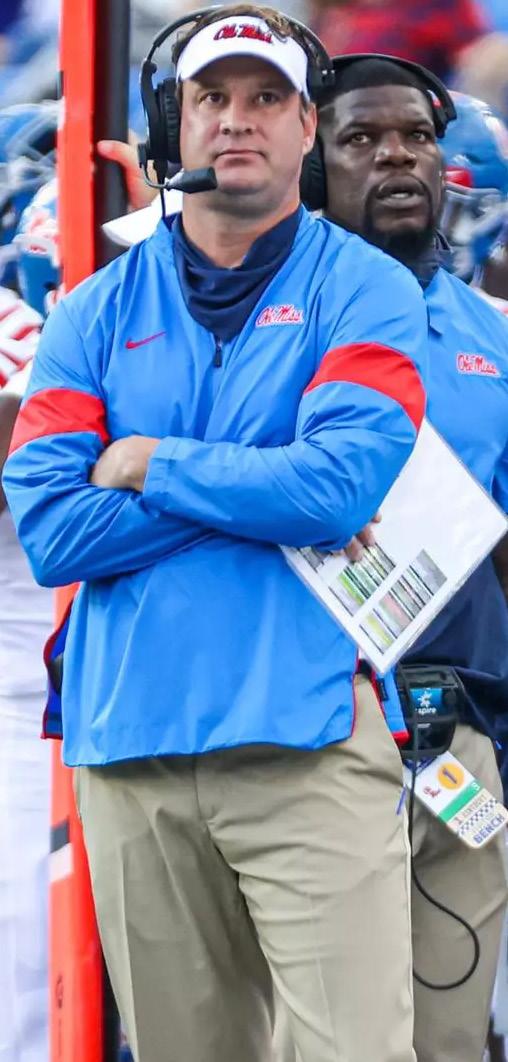
Wake Forest Football Head Coach Dave Clawson

Clawson acknwledged that he had known about the deal before playing Ole Miss in Winston-Salem the previous weekend but explained that no announcements were to be made until Wake Forest had nalized a new deal with Oregon State — which stipulates one game in 2025 and another in 2029. Clawson also reiterated Currie’s message about the nancial responsibility of the decision.
“I will assure Wake Forest fans this: in my whole time here, whether it’s working for Ron Wellman [Wake Forest’s previous athletic director] or John Currie, we’ve never spent money to get out of a game,” Clawson said. “We would never take a million dollars or any sum of the University’s money and spend it that way.” He continued: “We are gonna come out of this as a net positive nancially — a signi cant net positive — and people say well ‘how can that happen?’ I’m not going to dive into what the contracts are.”
According to a report from e Oregonian, Oregon State plans to pay Wake Forest $750,000 to schedule the series. Additionally, each home team will pay the away team $100,000 before the 2025 and 2029 games. e Old Gold & Black cannot con rm any additional payments to Wake Forest at this time.
e future for both schools
Meanwhile, on Oct. 7, Ole Miss Athletics announced that Washington State — the only other team currently in the PAC-12 alongside Oregon State — would take Wake Forest’s place on their 2025 football schedule.
“ e opportunity to face the University of Mississippi, with its rich football history, will be one our student-athletes, coaches and fans will certainly enjoy,” Washington State University’s Director of Athletics Anne McCoy said.
Despite the inconvenience caused by Wake Forest’s breach of contract, this wasn’t the rst home-andhome football series to be canceled for Mississippi.
Before the 2024 college football season started, Mississippi and the University of Southern California (USC) mutually agreed to terminate their own 2025 and 2026 trips to one another’s schools. e two programs cited the potential for Ole Miss to play one more conference game and USC’s e ort to join the Big Ten Conference in order to avoid playing the game.
For now, after the nearly month-long divorce between Wake Forest and Mississippi, both parties appear to have gone their separate ways and found better-suited opponents to play in 2025.
But in paying out and avoiding a rematch with Ole Miss, Wake Forest revealed the concerns that its athletics face as it strives to compete with other programs.
e statement from Currie points to the increasingly crucial role that nances may play in future decisionmaking at Wake Forest and in college sports in general.
“We’re going to be signi cantly ahead business-wise because of this, and I think at this point in college athletics, that’s important,” Clawson said.
PAGE 18
THURSDAY, OCTOBER 10, 2024
ADAM COIL Arts & Culture Editor
e Dillon Johnston Writers Reading series kicked o the semester on Oct. 1 with a performance by Steven Dunn and Drew Shamir, who were brought to Wake Forest by creative writing Professor Joanna Ruocco. Steven Dunn is a Whiting Award winner who has written three novels — “Potted Meat,” “water & power” and “Tannery Bay.” Drew Shamir is a writer, rapper, producer and lecturer based in Greensboro, N.C.
Almost all of the chairs in the Hanes Gallery were taken and the atmosphere was warm and buzzing, largely thanks to the big, inviting personalities of Dunn and Shamir. e two artists are cousins, and they brought family with them to the event, including Dunn’s mother. is familial dynamic instantly put everyone at ease and set the mood as one of celebration and coming together.
“I think it was especially cool that they were cousins,” junior Molly Steur said. “ e familial connection was really powerful, especially because so much of Steven Dunn’s work was connected to his family and his child. I really liked the way they built o of each other — it was very clear that they had an organic relationship.”
Dunn and Shamir began by reading aloud a section from Dunn’s upcoming work, in which Dunn played himself and Shamir played Dunn’s friend, who goes by Leonard West Virginia. While Virginia is traveling the world, he gives Dunn clues regarding his whereabouts — Italian women, sun-drenched lounging on a Mediterranean island, etc. is section got a lot of laughs, and I found it touching and even inspiring to watch two cousins get to perform their artwork for such an amicable, invested crowd. Dunn said that they used to collaborate like that all the time as children — except now they get to perform as adults.
After that, Shamir read aloud an essay he wrote about “What Goes Around,” a track from Nas’s 2001 album “Stillmatic.” Shamir, who described himself as a “politically charged rapper,” focused on how Nas’s lyrics confront perennial issues in the Black community, such as drug abuse, medical racism and the impact of Western beauty standards on Black women.
en Dunn returned to the stage to read from his upcoming travel book, in which he recounts a trip he took with his child to New York City to receive a prestigious literary prize. e piece was both heartwarming and hilarious. Dunn
re ected on the unlikely success he has achieved as a writer, the microaggressions his child faced while attending school in Scotland, the death of their mother and the unbreakable bond they have formed over the years. To me, the reading did not feel like listening to someone read from their written work, but more like listening to a good friend tell a great story from memory.
“ e event was a perfect demonstration of how good writing isn’t synonymous with using big words or fancy diction, but rather with speaking in your own voice and telling your story,” senior Enzo Menghini said.
e event wrapped up with a few live songs by Shamir.
“ e mini-concert was hype… the beats reminded me of ‘90s rap, and they were talking a lot about Nas, so I de nitely picked up on that inspiration,” senior Oliver Fallon said. “ ey did a very good job of blending comedy with some very emotional moments, so it really had everything in there.”
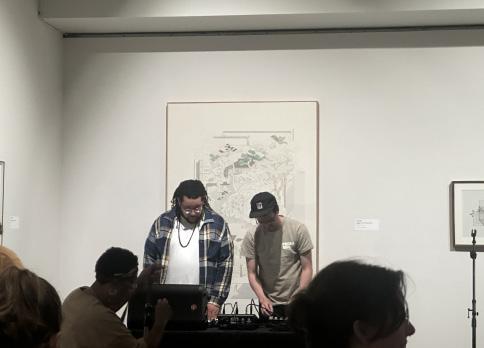
Shamir’s style felt deeply rooted in the rap tradition, with clear debts to Nas and Wu-Tang Clan, both of whom Shamir mentioned in his essay. I found Shamir’s performance to be a great way to close things out, as it sent everyone away in light spirits. ere was something goofy and endearing about watching a room of English professors nod their heads to Shamir’s beats, and I was all for it. Dunn and Shamir were the perfect choice to start the Dillon Johnston Writers Reading Series for this year, situating the event as a place where students can nd important art that is both fun and accessible, and feel a part of a Wake Forest community while doing so.
Contact Adam Coil at coilat21@wfu.edu
TAYLOR RILEY Staff Writer
“ e point of everything that I do is that words have power,” New York Times Bestselling Author TJ Klune said in the opening keynote of the Bookmarks Festival.
As I looked around at the other attendees, it was clear that his statement was accurate. Each year, thousands of people gather in Winston-Salem for the Bookmarks Festival of Books & Authors, which had its 19th anniversary this year. Words hold the unique power to unite thousands of strangers into an instant community, one that draws readers back year after year.
“It’s that community aspect that people really love and enjoy,” Festival Marketing Manager Juliana Reyes said. “It’s getting to meet other people who like the same books as them and want to talk about the same books as them.” e opening keynote was a packed event, despite the rain and hurricane warnings. People shu ed into the First Baptist Church on ursday night, with their umbrellas and signed copies of Klune’s latest book, “Somewhere Beyond the Sea,” dripping water onto the wooden pews. e room felt alive and electric despite the dreary weather.
Along with talking about his books, Klune spent a large portion of his keynote advocating for LGBTQ+ rights, speci cally speaking about trans rights and the necessity of ghting against anti-trans legislation.
“What is the point of having a platform if I’m not going to ght for my community?” Klune said.
It’s no surprise that this year’s festival gravitated toward politics, since the Presidential election is coming up. is year, the organization’s Book with a Purpose initiative focused on voting rights, promoting the book “One Person, No Vote” by Carol Anderson. Volunteers handed out copies of the book to attendees walking through the tents in downtown Winston-Salem on Saturday. is book was chosen to encourage everyone to speak out about their beliefs and to shed light on racial discrimination in voter suppression laws.
“We want people to be informed that your voice is important and your work is important,” Reyes said. “We want to help elevate [these conversations.]”
Book with a Purpose isn’t the only service that the nonpro t provides for Winston-Salem. is year, Bookmarks was able to donate 4,000 books to local schools to encourage literacy and a love of learning in children. Unfortu -
nately, Authors In Schools, the facet of the nonpro t that provides free author visits to local schools, was canceled this year due to Hurricane Helene.
Hurricane Helene diminished this year’s attendance, but the festival still garnered an impressive estimate of 16,000 attendees. e energy in downtown Winston-Salem was palpable on Saturday morning, as thousands ocked to the bright white tents of authors and local culture hubs such as e Little eatre and e Arts Council.
ere were opportunities for readers of all ages to have fun. Children and their parents rode on miniature train cars around the closed-o streets. ere was a face painting station, tents selling jewelry and an author-signing tent, which was by far the most popular. I walked down Spruce Street and talked to some of the authors, many of whom are self-published. Not only does this event connect readers to their favorite authors, but allows authors to connect with readers and promote their work. It shines a light on smaller authors, promoting greater visibility and diversity in readers’ choice of books. After getting all my book recommendations from TikTok for the past few years, it was refreshing to discover new books o ine.
is was my rst time at the festival, but it de nitely won’t be my last. It strikes the perfect balance between lighthearted fun and honest conversation about the state of the world. As the November election nears, remember that words have power. Use yours.
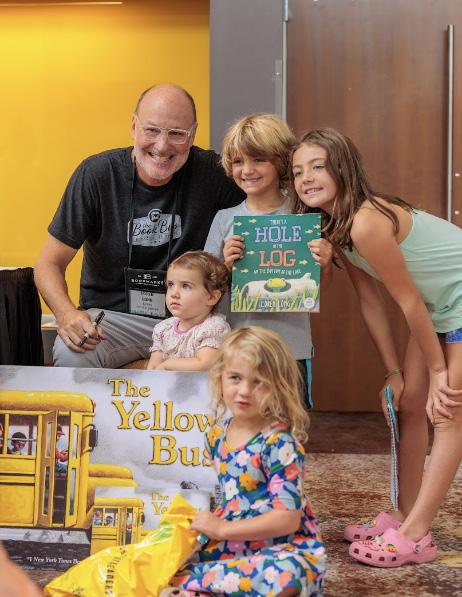
Junior Prarthna Batra shares how her Wake Forest experience has changed in the past two years
PRARTHNA BATRA Staff Writer
Around this time, two years ago, I was an anxious, lost and scared college freshman who was worried about tting into a college where I constantly felt like the odd one out. at rst semester, no matter what the situation was that I was in, I doubted myself and whether I was meant to be at this school.
Imposter syndrome was at an all-time high. e academic workload was a massive adjustment to anything I had learned or experienced back in high school in New Delhi, India. At the time, it felt like it only existed in my head despite it being one of the biggest cities in the world, because no one around me grew up there, had been there or understood what it felt like to belong there. I felt like everything that I had spent 18 years of my life learning was all changing in seconds, and it would be forever until I caught up to this new life around me. e American education system and the academic workload at Wake Forest were just a small part of why I was feeling lost and scared. e bigger feelings came from navigating the social environment. I was trying my very hardest to make friends and assimilate into what would be my new world for the next four years. I couldn’t have a conversation without realizing my accent, or rather the lack of an American accent. I was hy-
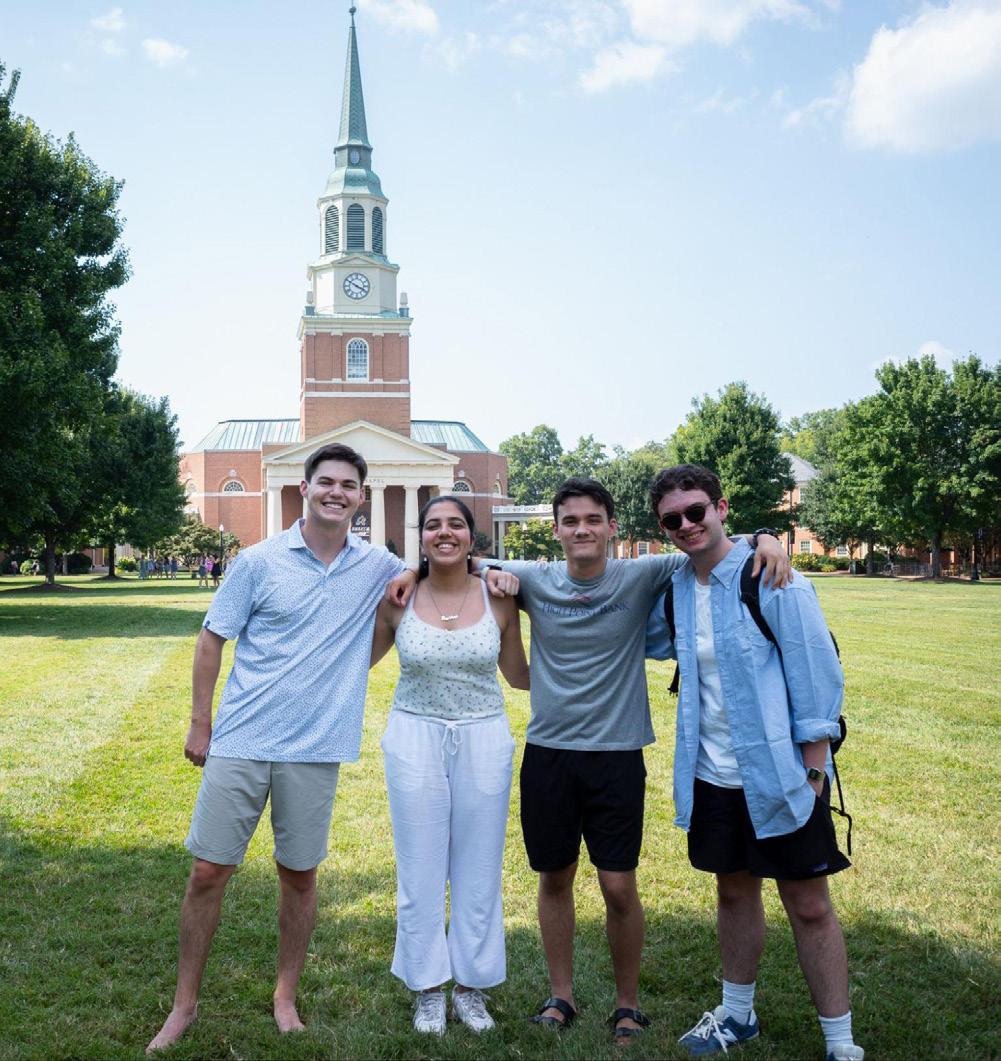
per-aware of the fact that I don’t look like all my friends and classmates. It is a strange and uncomfortable feeling to walk into rooms where you are often the only person of color or the only international student.
Systems like Greek life made absolutely no sense to me. Most students had grown up around people who were a part of Greek culture earlier on in their lives or, if not, they were at least familiar with it. I could not understand what it was that everyone seemed to be so excited and nervous about. Right before freshman spring, it felt like it was all that anyone cared about, and it made no sense to me. Until it did. e next semester, I realized how much of a role Greek life plays in the narrative of your social life here at Wake Forest. I felt left out because everyone around me was a part of these new organizations and friend groups and seemed like they were having the time of their lives, while I couldn’t even understand how this system worked.
at semester was probably the hardest and most anxiety-ridden semester of my college career. As hard as I tried to be optimistic and not focus on the di erences around me, they seemed to be overtaking the narrative in my head. I would have a panic attack almost every single day because I simply felt like I would never belong in a place where I was so di erent from the others. Keeping up with academics, making friends and surviving college by myself on the other side of the world felt like too much of a task. I even lled out some transfer applications and considered that seriously because I was tired of feeling like the odd one out and wanted to feel a sense of belonging and community.
Now that I sit and write this, at the beginning of my junior year here at Wake Forest University, I look back lovingly and proudly at my 18-year-old self, who has come such a long way. If you are reading this and you are worried about how the next few years of your college experience will shape out, please know: it does get innitely better, and I hope you will grow to love it. When I wrote this same article two years ago, I said that the optimistic side in me that sees my di erences as a positive factor is rarely the stronger voice in my head. Over the years, I have learned to create that sense of community for myself and hear that optimistic voice a little louder. It seems like clichè advice to join clubs if you want to make friends, but truly it is the best and most lifechanging thing anyone could have ever told me. Seek out places, communities and clubs that fuel something inside you. It goes a long way and teaches you so much about yourself. e clubs I am involved in on campus have single-handedly completely changed my college experience. I have learned an incredible amount about the
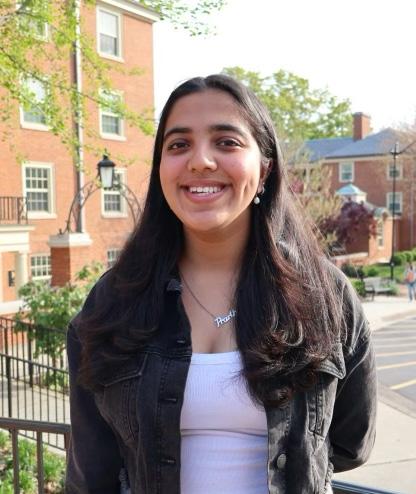
world (and myself) and made some of my best friends along the way.
Say hello to people in your classes — ask them to hang out! It feels so scary when you do it for the rst time, but is so rewarding. You have to remember that everyone in college is looking to make friends and feel a little less lonely. Our campus is equipped with so many incredible resources. My college experience is in nitely better because I decided to reach out — whether that is making friends or asking for help from your professors and other resources on campus.
Our di erences do make us unique and special. is world would indeed be a boring place if every one of us were the exact same. ere is something on this campus that is meant for you, but you have to go out and nd it for yourself! I would never change anything about my college experience now that I re ect on it at the beginning of the latter half. ere are still bad days in which I feel anxious and out of place, but the overwhelming feeling is one of being extremely loved and having a community that is helping me be the best version of myself.
Contact Prarthna Batra at batrp22@wfu.edu
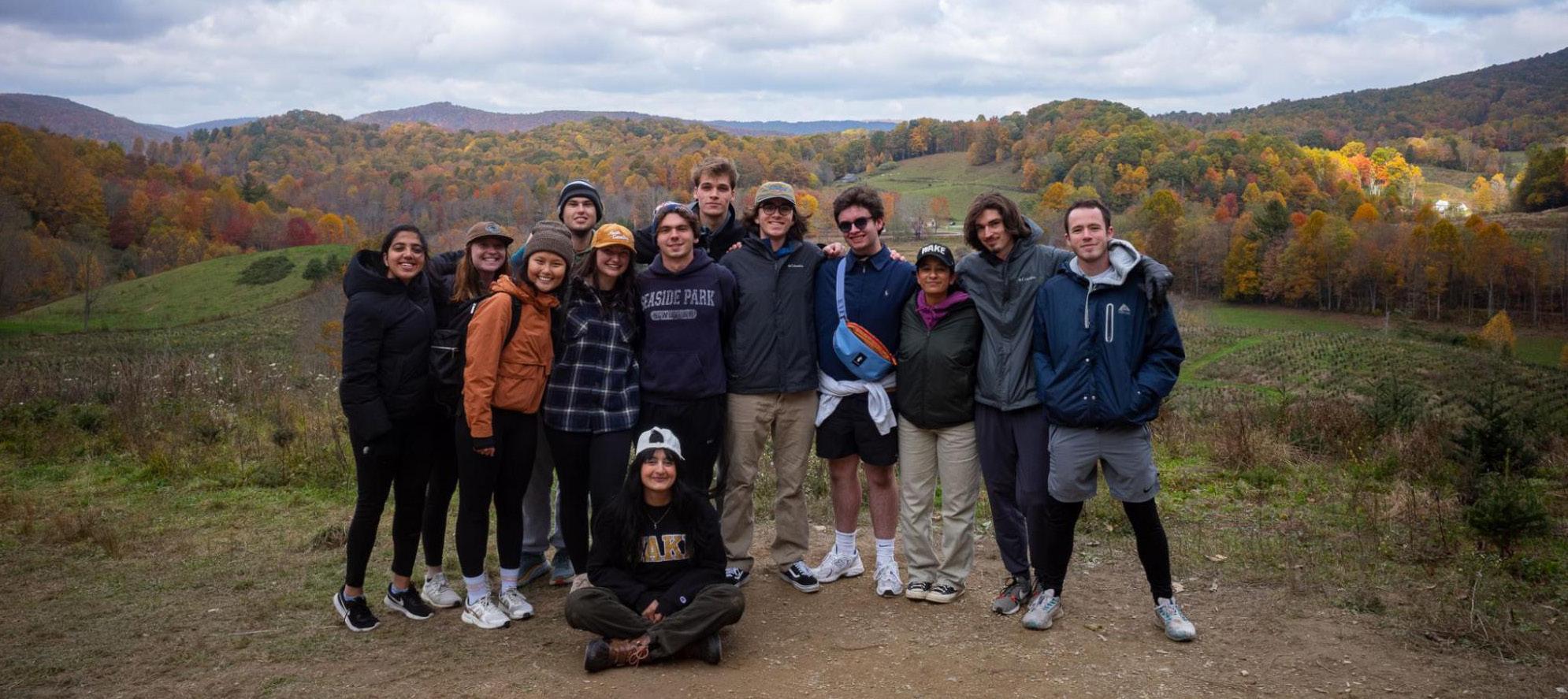
WILL HESS Contributing Writer
I have fond memories of going to the downtown farmers market in Memphis, Tenn. as a kid; seeing the local vendors connected me with my community and allowed little Will to see foods not available anywhere else. In order to connect with Winston-Salem in the same way, I decided to check out their farmer’s market in order to learn more about my new city. I heard about the farmer’s market before I saw it. ere was a live band playing the Beatles when I walked in, immediately setting the mood for what was to come. e venue did a great job of making the space welcoming for those wanting to browse; you could stay there for an hour, just as easily as you could stay ten minutes. e market took up a whole parking lot, making the space feel open and rustic. Most booths were tents with cash registers and folding tables; everything was personal.
Looking around, I noticed the wide variety of fresh produce available. Large orange pumpkins, freshly in season, were on display. I thought I should get one until I realized how stupid of an idea that would be, for there is no room for a large, orange pumpkin in a freshman dorm room. Instead, I gravitated toward the fresh wild-

ower honey. As a tea drinker, I gured the honey would nicely compliment my re ned drinking palette (and it wouldn’t spoil). Also displayed were vibrant peppers, lettuce, carrots, blackberries, peaches, and more. Many di erent regions of North Carolina were represented, allowing a visitor to support local businesses as well as the state economy. Accompanying the fruits and vegetables
was a wide array of raw meats; this farmer’s market could just as well have been a meat market. Coolers lled with sh over owed with ice while imported lamb taunted my wallet with its high–but justi ably so–prices. e ingredients on display could probably wind up in a ve-star restaurant in another life, but instead they will be most likely used by the home chefs of Winston-Sa -
lem. Fellas, you could probably make your lady a nice dinner with this stuff, or if you’re real cheap, it wouldn’t be a bad spot for a date, either. However, if you do not have a kitchen, or even a microwave, there is still value in visiting the farmer’s market. Alongside the produce vendors are a wide variety of food trucks and baked goods stands. Fresh coffee and pastries complemented the live music well, and the nice weather made loitering around the parking lot a viable option. I was drawn towards the fresh empanadas which I ended up trying for breakfast, and they were quite good.The pre-made food selection was just as tasty as the raw ingredients. Fellas, it wouldn’t be a bad spot for a date, either.
Taking a trip to the Winston-Salem Farmers Market is completely worth your time. It reminded me of a part of life devoid of college stress and worry; rather, I could focus on the community of my city. I will definitely be going back, and perhaps when I upgrade to a real house I can make a real meal with the rich assortment of ingredients on display. If you are free on a Saturday morning, stop by and support the local vendors, or grab a bite to eat.
Contact Will
KENLEY MCCLURE Staff Writer
If you’re anything like me, each year, you judge every pop culture phenomenon you nd on how good of a Halloween costume it could make. However, if you’re not like me, you’re in luck because I have done all of the heavy lifting and compiled a list of 2024 pop culture moments that are perfect for whatever you are looking to channel this Halloween season.
To start o , 2024 has been an iconic year for female pop artists, so who better to look to for Halloween inspiration than our resident pop princesses? Sabrina Carpenter’s “Taste” music video is a great place to start, with her and Jenna Ortega rocking many cute looks that often end up covered in blood, the perfect spooky touch. Another popular choice this season are costumes inspired by Charli XCX’s “Brat.” Rather you rock the signature “Brat” neon green or a club look as seen in the “Guess” music video, this option will be sure to make everyone “Talk Talk.” Looking for your favorite Halloween costume’s favorite Halloween costume? Look no further than Chappell Roan. Roan has rocked a ton of iconic looks on stage this year, but some of my favorites include her Statue of Liberty costume at NYC Gov Ball, her pink butter y at Coachella, and her drag perfection look during her NPR Tiny Desk Concert. Roan also opened for Olivia Rodrigo’s Guts world tour, in which Rodrigo rocked many fantastic looks of her own. e most fun for a Halloween costume though might be her nal tour costume she wears to perform “Get Him Back!” Rodrigo sports sparkly shorts, black tights,
a red megaphone, and a white tank top that says something di erent, although always funny and irreverent, every show. One of my favorite tops reads “Olivia Rodriguez,” in reference to the viral TikTok rating Rodrigo’s collab Crumbl Cookies. Making DIY tank tops with funny sayings could also be a great pre-Halloween activity for you and your friends.
Besides music, many movies and television shows of 2024 provide wonderful Halloween inspiration. For one, while Beetlejuice is always a popular costume, this year’s release of Beetlejuice Beetlejuice brings another excuse to whip out some iteration of a striped suit or Lydia’s red wedding dress.
Another popular costume that will for sure have a resurgence this year is the Joker and Harley Quinn, thanks to the recent release of Joker: Folie À Deux. e more pedestrian nature of the out ts worn by Joaquin Phoenix and Lady Gaga in the lm, compared to the cartoon Joker and Quinn, make them perfect for a Halloween costume. Paired with some dramatic makeup, your costume could be waiting in your closet already!
Although this lm technically doesn’t release until November, Ariana Grande and Cynthia Erivo have been giving us iconic pink and green looks for months in promotion for their movie musical Wicked. Glinda and Elphaba have been a classic Broadway duo for over twenty years, but they are about to burst onto the mainstream scene in a big way with this movie. Get ahead of the crowd, and nd your best witch to show that pink really does go with green.
For a trio costume, I, for one, will be disappointed if I don’t see multiple takes
on Tashi, Art, and Patrick from Challengers. Whether it’s tennis out ts, Art’s insanely high socks and backward cap, Patrick’s “I Told Ya” shirt, or Zendaya’s blue dress from the party scene, a costume from this movie is sure to serve up a good look.
In terms of television, one of my personal favorite shows Abbott Elementary is a great go-to for a more modest Halloween look. Grab your squad and get ready to channel the best teachers in West Philadelphia. For another easy TV costume, grab a white shirt and blue apron to embody Jeremy Allen White in e Bear. is costume is simple and easy, but will have everyone saying “Yes, chef!”
Looking to be one of America’s Sweethearts this Halloween? e success of the Dallas Cowboys Cheerleaders Net ix documentary is your chance to rock the blue and white uniform, and some cow-
boy boots, and show everyone the understruck dance you’ve been teaching yourself the last three months. Perhaps in a category of their own are some recent internet sensations. If you’re feeling like unlocking your wild side this Halloween, no better way to do it than by dressing up as viral animals Moo Deng, the two-month-old pygmy hippo from ailand, or Pesto, the king penguin from Australia. While these are a bit more abstract, considering Bowen Yang recently portrayed Moo Deng on Saturday Night Live, why not spend your Halloween as the world’s favorite hippo?
With such an exciting 2024 in terms of fashion, music, lm, and TV, nding a Halloween costume doesn’t have to be scary!
Contact Kenley McClure at mcclkj23@wfu.edu
